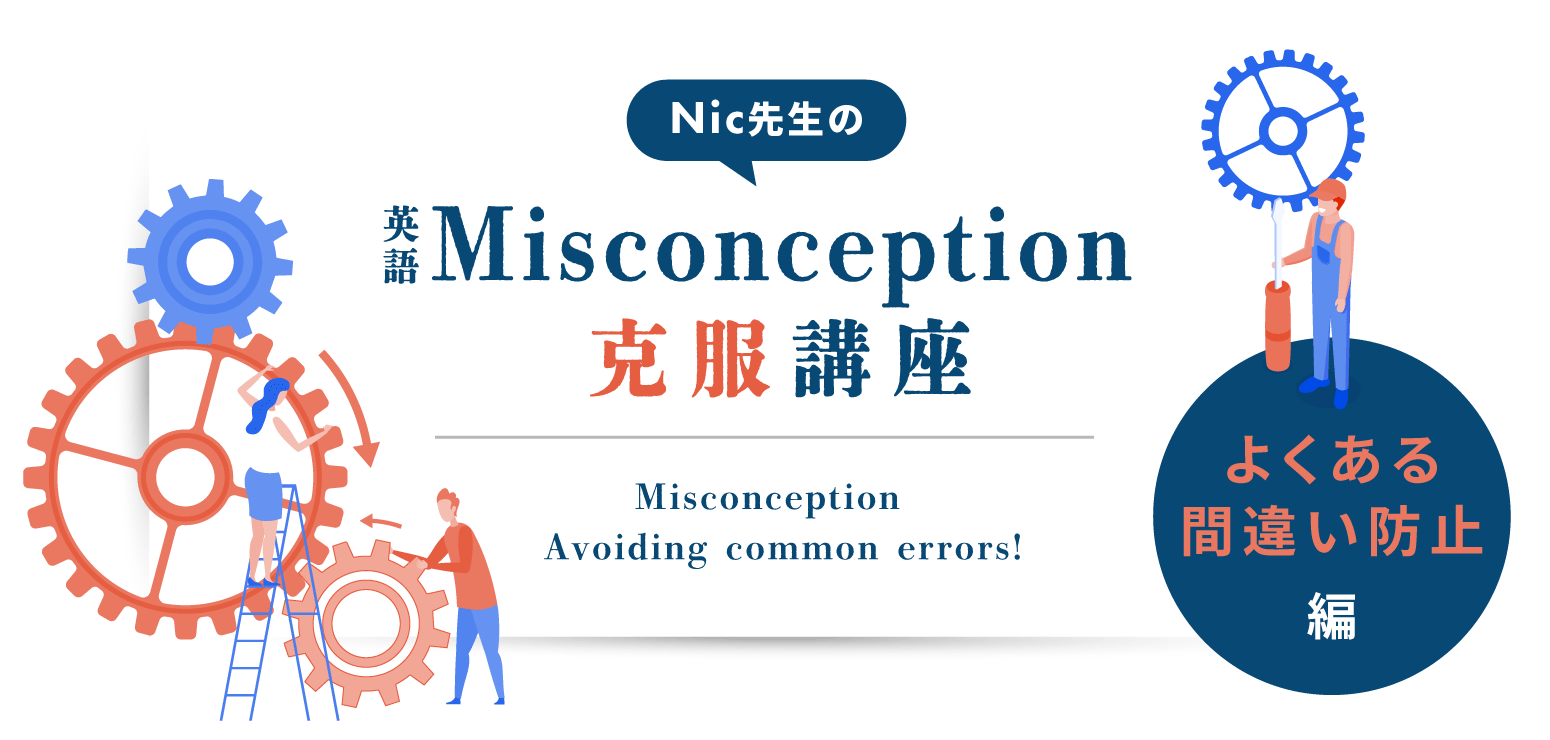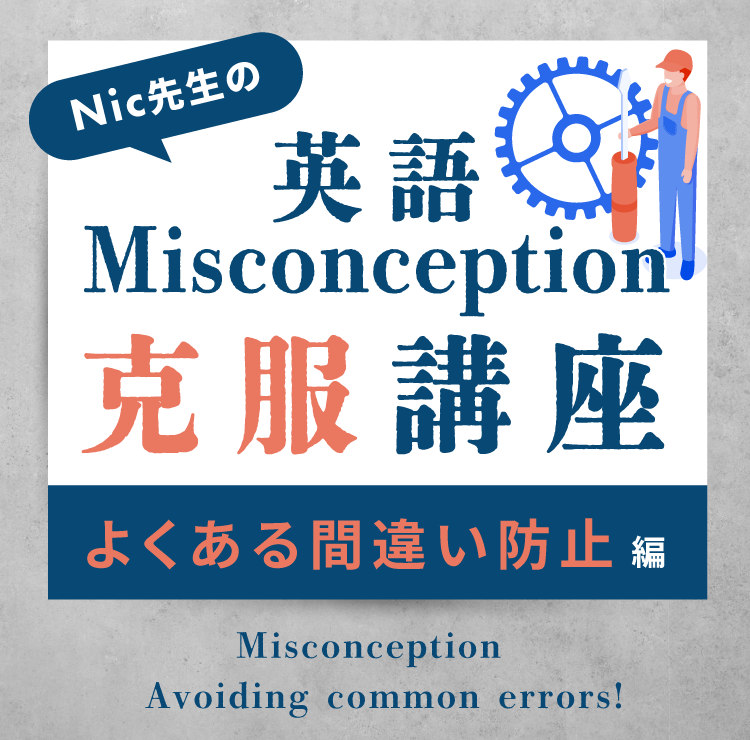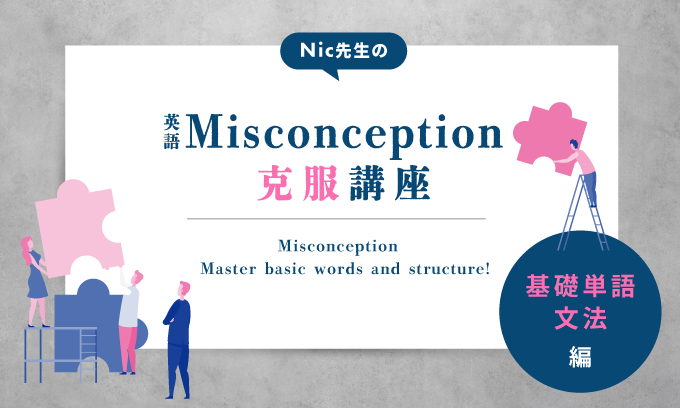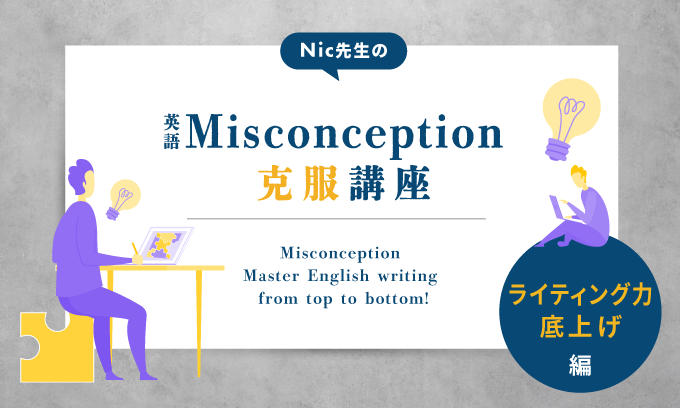

Misconception�����u����
�S����3��������ł���...
Nic�搶��Misconception�����u���́A
���L�̂悤�ɑS����3����܂��B
- ��b�P��E���@��
- �悭����ԈႢ�h�~��
- ���C�e�B���O��グ��
�����Ȃ�Ɠ��R�ł����A
���̂悤�ȋ^�₪�N���Ă��܂���ˁB

- �S����u���Ȃ��ƌ��ʂ��Ȃ��̂��ȁH
- �ǂ̏��ԂŊw�ׂΗǂ��̂��ȁH
- 1��u������A�c���2�̍u�����I�X�X�������̂��ȁH
�w��b���@�P��x�������Ƃ���
�����͂���܂���
�O��́w��b���@�P��ҁx�́A�ގ������p��̃j���A���X�̈Ⴂ���w�юn�߂邽�߂̍ŏ��̈���Ƃ�������������܂��B�����āA���Љ�Ă���w�悭����ԈႢ�h�~�ҁx�́A����ɐ[�����e�ɓ��ݍ���Ŋw�K���Ă����u���ł��B
������A�ȒP�ɐ�������Ɓw��b���@�P��ҁx�̑��҂ł��B���̂��߁A�w��b���@�P��ҁx�ˁw�悭����ԈႢ�h�~�ҁx�̏��ԂŊw�ԕK�v������悤�Ɏv����͓̂��R�ł���ˁB
�S�Ď�u����K�v�͖����̂�
���S���ĉ�����
�������A����ȏ��Ԃ��C�ɂ���K�v�͂���܂����B�������Ɂw��b���@�P��ҁx�Ŋw���e����ł����o�ꂵ�܂��B
�ł��A���̓_�Ɋւ��ẮA��������ƃT�|�[�g����̂Łw�悭����ԈႢ�h�~�ҁx����Q�����Ē����Ă��A���Ɠ��e�𗝉����鎖�͓������܂���B
���̂��߁A��{�I�ɂ͌��܂������Ԃ͂Ȃ��̂ŁA�����̂���u������X�^�[�g���đ��v�ł��B�������1�邾���ł��[���ɃX�L��UP��ڎw���܂��B
��ԑ�Ȃ̂́A���Ȃ��������������䂩���u����I�Ԃ��Ƃł��B������3�u���̑S�Ă��邱�Ƃł͂Ȃ��ł��B
- ��u�͑����ق������R�ł����A�m���ʂ�[�����e�܂ŗ������i�݂܂��B���̂���3�u�����ׂĂ���u���邱�Ƃ��������Ă��܂��B
�p����p��Ŋw�ׂ�u��������
�����ҁ`�㋉�҃��x����
�������Ă��܂�
�����Nic�搶��Misconception�����u���w�悭����ԈႢ�h�~�ҁx�́A�p��w�K���x���������ҁ`�㋉�҂̕��ł���ΒN�ł��Q���ł��܂��B���̂悤�Ɋw�K���x�������肷��̂ɂ͗��R������܂��B
�p��w�K���X�^�[�g��������̍��ł���A���{��Ő������Ă����Ȃ��ƈӖ��𗝉�����͓̂���ł��傤�B�������A�l�C�e�B�u�̎��j���A���X�⊴�o�́A�ʂ̌���ɖ|�Ă��܂��Ə��Ȃ��炸������\��������܂��B
�����炱���A��荂�����x����ڎw���̂ł���A�l�C�e�B�u�̉��l�ς��ۂ��Ƌz������̂���Ԃł��B���̂��ߓ��{��͈�؎g�p�����ɁA�e�L�X�g��w���̑S�Ă��p��ōs���܂��B
���̃e�L�X�g�œo�ꂷ��p��̃��x���́A���L�̉p���Q�l��Ŕc���ł��܂��B���̕��͂�ǂނ��Ƃ���ɂɊ������ɁA������x�̈Ӗ��𗝉��ł�����ł���A�u���̓��e�𗝉����Ē�����͂��ł��B
Nic�搶����̃��b�Z�[�W�i�p���Q�l��j
Misconceptions happen all the time. Everyone makes them. They occur when we believe something to be true, but our belief or thinking is based on incorrect information!
For example, when I was a kid, I used to hate the water. I didn't like swimming, I hated taking baths or showers, and I would never, ever enjoy going to the beach. Then, something changed. I lived abroad, and discovered more of the world! Specifically, I did a research project in Australia, and I took up surfing. When I returned, and told them that I wanted to go to one of the famous beach areas near our house, they were shocked. I hate the beach. "Why would you want to go to the beach!" they said. Well, this was a misconception of theirs. I returned from Australia a different person, and based on incorrect information that they held about me, they had a misconception of me! Don't let this happen to you!
As an English learner, you are in a great position. Some native speakers will make the errors you see in this course. It may surprise you, but even native speakers have misconceptions about their own language! However, they don't know it, and they will never change! Luckily, you can change. Since you're learning English �efresh', with no preconceptions, you can learn things the correct way! Even if you have misconceptions now, they are usually easy to fix. You just need to be shown the correct way.
Most importantly though, you need to have an open mind. Don't be afraid to ask questions, and don't be afraid to make mistakes. In fact, making mistakes, and asking questions about those mistakes is one of the best ways to learn. By engaging yourself in your errors, and actively trying to correct them, you can increase your ability to retain information.
Also, remember that learning English is about communication. You want to be able to communicate your ideas and your feelings to everyone, no matter where they are. However, you won't be able to do that if you make errors! You want to be able to communicate yourself, but you want to be accurate!
We live in a world where it's possible to communicate with people around the world. You can communicate with people from a huge variety of cultures, with their own customs, traditions and social values. So, it's even more important that you learn to communicate accurately. It's OK to make mistakes about other cultures. That's what happens when you experience something new! I can't count the number of times I've had misconceptions about countries, and then learned better after I visited them. People understand mistakes. However, you must be able to express yourself clearly. If you can communicate clearly, then you can explain your intentions!
In this course, we will focus on �ereal' English situations. We'll look at some of the most common English words there are, such as go and come, as well as words like very and so. We'll also look at making your writing more advanced, and working on common misconceptions that Japanese learners have about sentence structure.
I can't wait to teach you everything I know, and enable you to have great experiences in the world. We live on an amazing planet called Earth. Let me give you the tools to experience it!
Nic
���Ȃ����p���
���̂悤���ԈႢ�����Ă��܂��H
�ł͍���̍u���Ŋw�ԂƋ�̓I�ɁA�ǂ̂悤�ȁw�悭����ԈႢ�x��h�~�ł���̂���14�p�^�[���قǏЉ�܂��B
���̂��߁A�w���̉p��͕p�ɂɎg���Ă�ȁx�Ǝ������g�ɊY��������̂�����Ȃ�A���Ђ��̋@��ɉ��P���邱�Ƃ��I�X�X�����܂��B

-
�p�^�[���@
���܂ŁA�wI have few friends�x �Ƃ��wI have much to do today�x �Ƃ����p����g���Ă��܂���ł������H�����̕\���͕s���R�Ȃ�ł��B�������\���͂ǂ��Ȃ�ł��傤���H
-
�p�^�[���A
�����̓��{�l���A�w�`�ł���悤�ɂȂ����x���wcome to be able to�x���g���܂��B�������A�����Ǝ��R�ŃV���v���Ȍ�����������܂��B�ɂ��ւ�炸�A�s���R�ȉp��\����I�Ԑl���������܂��B
�悭���鋤�ʂ̊ԈႢ�́A���̏ꍇ�A���ɂ��Ȃ����m���Ă���ȒP�ȒP��Œu�������鎖���ł��܂��B�����ăl�C�e�B�u�͓���P����g���Ă��܂���B
-
�p�^�[���B
�w�`���Ȃ��^�`������x���wI am wondering�`�x�Ŏn�܂镶�͂��������܂��B�قƂ�ǂ̓��{�l���������������Ă��Ȃ��\���̈�ł��B
���̕\���𐳂����g���ɂ͂����̔閧������܂��B��������������Ă��Ȃ��\�����A�ق�̏����̃R�c�Ő������Ȃ�܂��B -
�p�^�[���C
Nic�ɂ͓��{�l�̗F�B�����܂��B���ꂩ��Љ��ԈႢ��Nic�B�l�C�e�B�u���Ԃł�����Ƃ����L���l�ɂȂ��Ă���F�l�����܂��B
�ނ͏�ɁA�u��Ђɍs���Ȃ��Ɓv�ƌ������A�wI have to go to my company�x�ƌ����̂ł��B���S�ɂ��������\���ł��B
��������̌�����������܂����A�����ł��𗧂̂͂��Ȃ��������m���Ă���P��ł��B -
�p�^�[���D
- �wI come there by train�x���w�d�Ԃŗ��܂����x
- �wHe went there by bike�x���w���]�Ԃōs���܂����x
�Ȃǂ̕\���͊ԈႢ�ł��B
�l�C�e�B�u�͂���Ȍ������͂��܂���B�����ԈႢ�Ȃ̂ł��傤���H���́A�������������S�Ă��ԈႢ�ł��B�ǂ����ē��{�l�̉p��́A����Ȃɖ�肪�����̂ł��傤���H
���̍u���ł́A���Ɍ����������{����������{�I�ȃj���A���X��O��I�ɗ������Ă��炢�܂��B -
�p�^�[���E
���Ȃ��́u�l�v��\������Ƃ��A�ǂ̒��x�̕p�x�Łwpeople�x��wperson�x���g���Ă��܂����H�����p�ɂɎg���Ă���Ȃ�A�������ׂ��ł͂���܂���I
�ނ�l�C�e�B�u�͂��̒P������I�Ɏg�����͂���܂���B���{��Ō����u�l���v�Ƃ�����ۂɋ߂�����ł��B
�l�C�e�B�u�����̂悤�Ȏ��Ɏg���̂́wanyone�x�Ȃ̂ł��B���̍u���ł́A���{�l���Ƃɂ�����Ⴂ�ȏꏊ�Ŏg�������ȒP����Asomeone�Aeveryone�Asomething�A anywhere�Ȃǂ��g���āA�ǂ�TPO�ɍ������\���ɂ��邩�̃��[���������܂��B
������u�����ǂ����ɍs�����I�v�ƌ������������A���{��́u�ǂ����v�Ɉ��������āwLet's go somewhere tomorrow�x�Ȃ�Ă��������Ȃ��Ȃ�܂��B
-
�p�^�[���F
�wsome�x�Ɓwany�x�Ɋւ����p�́A���{�l���悭�ԈႤTop mistakes�̈�ł��B
�wSome students in the class were confused�x ���ԈႢ�ł��B���̕��͂͂ǂ��������ׂ��Ȃ̂ł��傤���H -
�p�^�[���G
���[���ɕq���߂��܂��H�{���̉p������낻��w�ԂƂ��ł��B���ʂ�������Ȃ����ł��A�p��������K�v������܂���ˁH����Ȏ�s/he�Ƃ�she/he�ƕ\�����Ă��܂��H
The student told his/her teacher the correct answer.
���k�����ƒ��ɓ��Ă��Đ搶�ɓ�����`���܂����B�m���ɐ搶�͈�l������Ahis/her�ɂȂ�̂ł����A�ł����ʂ�������Ȃ�������H����Ȏ��A�P���ł�they��their���g���̂������m�ł����H
�������p��́A���Ȃ������܂Œm��Ȃ�������������܂��A�Ȃ�ƁAThe student told their teacher the correct answer. �Ȃ̂ł��B�P���ł�their���g���̂������ł��B
-
�p�^�[���H
�p��㋉�҂Ǝ����Ƃ��ɔF�߂�ꂽ���Ȃ�A�����Ŋw�Ԃ��Ƃ͏d�v�ł��B���������@�m�������ł͒������Ȃ��ǂ������ɂ���܂��B
���Ȃ��́AThis year, I will improve my English. �Ƃ��A Yesterday, I took my son/daughter to the park.�ƁA���Ԃ�\�����t���珑���n�߂Ă��܂��H���傤�Ǔ��{��ł������Ă���悤�ɁB���ꂱ�������̓��{�l�̉p��̓����ł��B
�Ȃ��A�l�C�e�B�u�̂悤�ɁAI will improve my English this year. �Ƃ��A I took my son/daughter to the park yesterday.�Ə����K�v������̂ł��傤���H����͂Ȃ��ł��傤���H�����Ă����ē��{�l�������悤�ɏ������͂ǂ̂悤�Ȏ��Ȃ̂ł��傤���H
���͂̍\���A���Ԃɂ͂�͂藝�R������̂ł��B���̗��R���w��ʼn������B
-
�p�^�[���I
���Ȃ��͂���ȉp����g���Ă��܂��H
- I'll show you the way to the train station.
- Tell me the time you will arrive.
�l�C�e�B�u�͂��̂悤�Ȏ��A���Ε���(why��how)���g���܂��B
�����琳�������͂�
- I'll show you how to get to the train station.
- Tell me when you will arrive.
���̂悤�ȕ\���ɂȂ�܂��B
���Ȃ��ɁA���Ε��� how�Awhy�Awhen�Awherever�Awhomever�Ȃǂ̐������g�����Ǝg���ׂ��ꏊ�������܂��B���̂��ߍ���͂�萳�����\�����g�������ł��܂��B
�����ƕ��@�����̑g�ݍ��킹�ł͂��ǂ蒅���Ȃ��l�C�e�B�u�Ɠ����p��\�����ł���悤�ɂ��܂��B -
�p�^�[���J
���͂��\������߂̌ꏇ�ɂ��ăl�C�e�B�u���K�p���Ă���Q�̃��[�������Ȃ��̉p��Ɏ�����ĉ������B
I am going to the beach today, and I met my friend yesterday.�Ƃ������͂͂Ȃ��_���Ȃ̂�������܂����H
���Ȃ��́A���̍u�����鎖�ŁA�߁i�O�㔼��2�̕��͂��Ȃ����̈ʒu�ł͂��߂Ȃ̂��H�Ȃ��J���}���K�v�Ȃ̂��A�������ڑ����̎g�����ȂǕ��͂Ɋւ��邷�ׂĂ��w�ђ������Ƃ��ł��܂��B -
�p�^�[���K
���B�͏�ɓ��{�l�̉p��w�K�҂Ɏ�g�`���g���ȂƎw���������Ă��܂��B����قljp��ł͎�g�`���g���܂��A�g�����͂�������ꂽ���ł��B
�ł����قƂ�ǂ̓��{�l�����{��̕\���̂܂܉p��ɂ�������Ǝv���Ă���̂ŁA���{�l�̉p��͎�g�`���炯�ł��B���{��ɂ͎�ꂪ�Ȃ��̂łǂ����Ă���g�������Ȃ�̂ł�قǒ��ӂ��Ȃ��Ƃ��̃~�X�ɂȂ���܂��B��g�`���g���ׂ��������^�C�~���O���w��ʼn������B
-
�p�^�[���L
�Ȃ������̓��{�l�w�K�҂͌��܂����悤�ɁA���������Ă��܂��̂ł��傤���H
It was the first time to travel for me to another country.
����Ӗ����@�̎����̂悤���Ɗ����܂��B�܂�ŁA���ꂪ���܂肫�����B��̌^���̂悤�ɁH���{�l�́Afor me, to me, ������I��we�̐������g���������m��Ȃ��悤�Ɏv���܂��B
-
�p�^�[���M
���{�l�͂Ȃ���it to�\����It that�\������D���ł��B
�wIt was difficult for me�x �ƁwI thought it was difficult�x�͉����Ⴂ�܂����H�����āAEnglish is difficult for me. ���̍u���Ŋw�ׂA��������Ȃ������ȕ\�����x�Ƃ��Ȃ��ōς݂܂��B
I find English difficult. �Ƃ��AI don't think English is difficult!�Ƃ����悤�Ƀl�C�e�B�u�����Ă���̂Ɠ����悤�ɁA���R�ɕ\���ł���悤�ɂȂ��ĉ������B���{�l�͏�ɉp��ɐG�����ɂȂ��̂ŁA������x�͕��@�ʂ��當�͂�g��ł����K�v������܂��B
�ł��T�^�I�ȓ��{�l�̃~�X������郋�[����m�邱�ƂŃl�C�e�B�u�̂悤�ɕ\�����鎖�͂ł��܂��B
Nic�搶�̓Y��o�����猵�I����
�w�悭����ԈႢ�x��
�����ł���w�K���@4�I

-
-
1�y�S12��z�l�C�u�t�̃}���c�[�}���Y��w��
-
��u���ɂ́A�e�L�X�g���ނ���W�Ȃǂ��g�p���Ċw��Œ����܂��B�����āA����2��ق�Nic�搶�ɉۑ���o����ƃ}���c�[�}���œY��w�������Ă���܂��B
���[�����X�Ő^���ȑΉ������Ă����Nic�搶�̓Y��͐l�C������A�t���[�c�t���C���O���b�V���̍u�t�̒��ł��A��ʃN���X�Ƀ����N�C������Ă��܂��B����Nic�搶�Ƃ̓}���c�[�}���̓Y��w���ȊO�ɂ��A���ʃZ�~�i�[���J�Â���\��ł��i2���Ԃ̃Z�~�i�[��1��J�×\��j�B�e�L�X�g���e������ɐ[�@�肵�ANic�搶�ɒ��ڎ��₷�邱�Ƃ��\�ȏ[���������Ԃ������܂���I
-
-
-
2�y340�y�[�W�z���z�{�����[�������Ղ�̉p�ꋳ��
-
Nic�搶���J�����ꂽ�e�L�X�g���ނ͑S����5���ł��B1~5���܂ł����v�����349�y�[�W�ł��B
���̋��ނ̒��ɂ́A�t���[�c�t���C���O���b�V���̓Y��f�[�^��Nic�搶�̉p��w���o�����瓱���o�����w�ގ������p��\���x��w�悭����ԈႢ�x���Ïk����Ă��܂��B���̃e�L�X�g�ŋ�̓I�ɁA�ǂ�Ȋw�K�����邩��Vol.1���珇�ԂɏЉ�܂��ˁB
�p��Misconception�����u�b�NVol.1
��u������킵�₷���ᕶ ���p��Misconception�����u�b�N Misconception2 Vol.1�́A�O�u���u�p��Misconception�����u�� ��b�P��E���@�ҁv�̕��K�̏�ƂȂ��Ă��܂��B
���e�œ��ɋ�킵�Ă���������������ԈႢ�����ׂ����E��̓I�ɐ������Ă��܂��B��A�T���v���Ƃ��ė���Љ�Ă��܂��B�Ⴆ�Anotice��realize�͋�ʂ̓o�b�`���ł����H
I noticed that you got a haircut.��I realized that you got a haircut. �͂ǂ��炪���R�ȕ\����������܂����H
MORE�p��Misconception�����u�b�N Vol.2
�ގ��P��̈Ⴂ���킩��ᕶ ���p��Misconception�����u�b�N Misconception2 Vol.2���獡��̍u���p�ɁA�l�X�ȐV�������e�����グ�Ă��܂��Bthere��it�̈Ⴂ����Athat��this�Ahere��there�̔�r��L�x�ȗᕶ���g���čs���Ă����܂��B
�T���v�����2�ځAcome��go�̈Ⴂ�͒N�ł���x�͊ԈႦ�����Ƃ�����̂ł͂Ȃ��ł��傤���H�Ȃ��A���{��́u����v�Ɓu�s���v�݂����ɃV���v���ł͂Ȃ��̂ł��傤�I�u�N�v�ڐ��Řb���Ă��邩�ɒ��ӂ��Ċw��ł����܂��傤�I
Volume 2 is an expansion of the previous course, and describing a situation with there and it. However, we go even more in depth, and look at describing people, places and the world more naturally! There are lots of misconceptions related to this topic, and here are 2!
1. this vs thatThis section is actually part of a larger section, where we cover other phrases like here vs there. In fact, it may be one of the most common misconceptions of all! Here�fs a quick lesson!
This - in the context of space and time, this is a pronoun used to refer to something relatively close to the speaker, such as the most recent event, or something physically near the speaker.
Will you come to the party this weekend?
We use this to refer to the closest weekend in time, which is the upcoming or weekend of the current week.
Look at this dog by my foot.
Since I'm referring to a dog very close to me, by my own foot, this is used to emphasise this close physical distance.
That - once more, we use that as a pronoun. However, that is used to emphasise something that is not close in space or time, such as something far away from us, or occurred a long time before or will occur a long after the present time.
Did you go to the party that weekend?
In this case, that weekend is a bit unclear. However, what is clear is that the weekend you are t referring to did not occur recently. That is, the party occurred a relatively long time ago in the past.
Look at that dog by your shoe.
In this case, it�fs not clear how far away the dog is. However, it is clear that the dog is closer to the other person, and farther away from the speaker. For example, if this was a conversation, the dog would be closer to the person being talked to, and farther away from the speaker!
2. Come vs goThis section is part of another larger section, covering other verbs like bring and take, as well as get and be.
Go - used to describe movement away from the speakers current or usual location.
I will go to work in 1 hour.
Notice that we use go here to emphasise travelling away from our current location. That is, we are not at work now, and are not usually at work, but we will travel there in 1 hour.
Come - used to describe movement towards a location near, or common and familiar to the speaker.
I will come home from work in 1 hour.
The key information here is home. Since home is a common or familiar location for the speaker, it is the place they live, we use come to refer to movement towards this location, and away from work which is a less common or familiar place.
Here�fs a common mistake:
Can you go to my house in 30 minutes?
Remember who the speaker is in this sentence. Here, the speaker is asking the other person to travel to their home. That is, the speaker wants the other person to travel to their own home, towards themselves. So, we use come to refer to movement towards a location near or at the speaker�fs location.
Can you come to my house in 30 minutes?
MORE�p��Misconception�����u�b�N Vol.3
�`�e�� VS ���� ���p��Misconception�����u�b�N Misconception2 Vol.3 �̃t�H�[�J�X�͌`�e���ƕ����ł��B�`�e���ƕ����W��misconception�A�ӊO�ɂ�������ł��B
����������Ƃ��Ȃ����C�t�����ɂ��̂悤�Ȍ�������Ă��邩������܂���B�Ⴆ��so�͉p��̂Ȃ��ł����Ƃ���p�������P��̂P�ł��B���̈ꌩ���������ȕ��́A�Ȃ��ԈႢ���킩��܂����HWe had to stay so late at the office today.
����ɂ��̏͂ł͓��ݍ��݂܂��B�������`�e���̂悤�Ɏg���邱�ƁA�m���Ă��܂������H
�Ⴆ�A��w�̐}���فA�����̃x���`�Ƃ������\��������ۂɁA�ulibrary of the university�v�ubench in a park�v�ł͂Ȃ��A�����ƃV���v���Ɂuthe university library�v�upark bench�v�ƌ�����悤�ɂȂ�܂��傤�B
����������ΊȒP�Ȃ悤�Ɏv���܂����A���{�l�̉p��͂قڑO�u�����̑O�҂Ŕ��ɂ킩��ɂ����Ȃ��Ă��܂��B���X����������̂́A���������ł���Ă݂悤�ƁI�Ǝv���Ƃ��߂���Ă��Ă��܂��̂ł͂Ȃ��ł��傤���H
Misconception�ł͂���܂��A���Ȃ��̉p��������ƃV���v���ŕ�����₷���A�l�C�e�B�u�̋����������̂ɂ��邽�߂ɁA���̋@��ɂ��Ȃ����������`�e���̂悤�Ɏg�����@��[�����K�����܂��傤�BFor this volume, we focus on adjectives and adverbs. There are a surprising number of misconceptions related to their use, especially regarding adjective structure.
1. Using so as an adverb.Aside from this and that, using so is one of the most commonly confused words in English!
This is because its use is related to context.
Normally so has 2 common uses:
1. to describe an extent, or how one thing affects the other. This is commonly used with another clause and the relative pronoun that.
He is so tired that he can't walk.
This sentence shows the result of the person being tired. That is, he is very tired, and he is unable to walk as a result of his tiredness.
2. emphasis in informal sentences.
I am so hungry today!
In this case, so is used the same way as adverbs like very or really, to emphasise the degree that I am hungry.
The most common misconception is related to 2. This is because of context and use. This is only used in informal sentences or situations. Also, so is very strong, and usually only used to refer to how we feel, rather than actions.
For example,
We had to stay so late at the office today.
Notice that so refers to late here. However, late is referring to the action of staying late. This is unnatural.
I was so angry because we had to stay late at the office today.
This is the difference between using so with feelings compared to actions. Notice that it�fs fine to use so angry, as angry is an adjective describing my opinion of staying late.
2. Using nouns as adjectivesThis is not a misconception, but rather a way to make your writing simpler and more advanced. It�fs common to use some nouns as adjectives. We cover many ways in the textbook, but the most common way is using locations.
In general, we can use the larger location or place something is located as an adjective. That is, if something is located within something else, we can use the larger object, or the object that contains the other object as an adjective. This commonly replaces prepositions like of or in
This is easier with examples:
library of the university
Instead of using of to connect these nouns, notice that the noun university is larger. That is, the university contains the library. So, we can write the following:
the university library
Here�fs one more example:
bench in a park
Again, notice that the object bench is located inside a larger area, which is a park. So, we can more simply write:
park bench
There are many rules for this type of simplification in English, and it�fs one of the best ways to make your writing more natural! We cover them all in the course!
MORE�p��Misconception�����u�b�NVol.4
�V���v���ɕ\���ł��镶�͗� ���p��Misconception�����u�b�N Misconception2 Vol.4 ����͕��̍\���Ɋւ���misconception���Љ�Ă��܂��B
misconception�����R�ŕ����K�v�ȏ�ɕ��G�ɂȂ��Ă��邩���H��莩�R�ŃV���v���ȕ���������悤�A���͗̓A�b�v��ڎw���܂��BVolume 4 is focused on sentence structure. We focus on making your sentences more natural by changing the structure. In addition, we look at ways of making structure simpler, and thus more natural! One of them is actually a continuation of our look at adjectives in Volume 3.
Here are 2 ways to make your writing more natural by changing your structure!
1. Using proper nouns as adjectivesHere�fs a topic that may be unfamiliar for many Japanese speakers. In English, we can actually use proper nouns as adjectives.
Remember that proper nouns are names for individual people, places, organizations or other unique objects, that are referred to with a capital letter. For example, Nic is a proper noun, because it�fs the name of an individual person: me!
So, a common misconception is the following:
She went shopping at the shop of Fruitful Company.
Notice that Fruitful Company is a proper noun. It�fs written with a capital letter, and Fruitful is the name of an individual company. So, rather than using of to connect the noun shop with the company that the shop belongs to, we can write the following:
She went shopping at the Fruitful Company shop.
Without using a preposition, we can use Fruitful Company as an adjective by placing it before the noun shop.
Here�fs one more:
He always drank his coffee from his cup made by Starbucks.
Notice that we can simplify this even further. Not only can we replace the preposition by this time, but also the verb make as well!
He always drank his coffee from his Starbucks cup.
There are a few more cases of using proper nouns as adjectives as well, that we talk about in more detail in the text!
2. Writing positive and negative information when using conjunctionsThis is a common mistake, and one that is very important to avoid. This is because it can lead to misconceptions in meaning!
Let�fs look at a sentence. What does the following mean?
The presentation was not difficult to understand and good.
if you use not to refer to difficult first in the sentence, before the adjective good, this means that the negative form not also refers to good. This is because you use the conjunction and. So, the meaning of this sentence is the same as the following:
The presentation was not difficult to understand and the presentation was not good.
If you think about the meaning, this is a bit strange! Not difficult to understand is a probably good for a presentation, so also saying the presentation was not good is strange!
Instead, this is what the writer meant to say:
The presentation was good and not difficult to understand.
There are many other examples of this, and writing positive and negative information in sentences. We also compare the use of the conjunctions or and and when writing sentences with positive and negative verbs! This is another common misconception!
MORE�p��Misconception�����u�b�NVol.5
�����E���� ���ŏI�̉p��Misconception�����u�b�N Misconception2 Vol.5 �ł͕��ɋ����E�������������@���w��ł����܂��B
�Ⴆ�A�Ԃ��������������ڂ������Ă��邱�Ƃ��������ł����H���͎ԁA�����u�`����v��\���܂�Ȃ����@�ł͂Ȃ���ł��B���{�l���L��misconception�����炵�A�l�C�e�B�u�̂悤�ɉp���������悤���N�Ԋ撣���Ă����܂��傤�I
For our last volume, we look at ways to create emphasis in your writing. There are many ways to do this, and we already looked at using adjectives before in Volume 3.
However, we will look at ways to create more focus on the subject, and to emphasise meaning.
Here are 2 great ways.
1. Passive voiceIn terms of grammar structure, this is by far the most commonly confused subject by Japanese writers.
How many times have you written sentences like the following:
We can see beautiful cherry blossoms in Japan in spring.
With recordings, we can listen to Nic�fs example sentences at any time.
Do these sound natural? They shouldn�ft! Can you tell why?
There is one common element between these sentences: we. Remember that we refers to yourself, and a group of 2 or more people. However, who is being referred to with we here? Exactly! It�fs not clear. In fact, it doesn't matter who is being referred to. In these sentences, it�fs not important who the action. Instead, the most important part is the action itself.
This is where we use the passive voice:
Beautiful cherry blossoms can be seen in Japan in spring.
With recordings, Nic�fs example sentences can be listened to at any time.
There are many more examples and uses of the passive voice, and more misconceptions! We cover lots of them, and I guarantee by the end of my course that you'll have a much greater understanding of this frequently confused topic!
2. Using possessives more naturallySimilar to our look at the passive voice, there are many, many uses for possessives. However, one of the most natural ways is to use possessives to replace phrases like to someone or for someone. We�fll look at only one case here, but it�fs perhaps the most commonly used. The only problem is, it�fs not the most natural way to phrase this sentence!
Have you ever written the following?
Last year was the first time for me visiting/to visit Canada.
This is acceptable, but not the way a native speaker would phrase this. In general, we try to place important information first in the sentence. An example of �eimportant information' is who or what information relates to.
In the above sentence, the information first time to visit/visiting Canada refers to the person speaking. That is, it refers to me. However, we can place this information earlier by using the possessive:
Last year was my first time visiting Canada.
This is much better! By using my first in the sentence, the reader more quickly knows who the reader is referring to: themselves. Then, the information about the writer comes after. Notice that only the gerund form visiting is used, to refer to an action that occurred in the past.
We look at other uses of the possessives, mainly to simplify and make your writing more natural!
I hope this brief introduction helped you learn a little bit. Do you have any of the misconceptions that I mentioned! That�fs OK if you do! Making mistakes is the only way to learn! Remember that this is only a small part of my course, so I'm looking forward to looking at even more misconceptions, and showing you ways to make your writing more natural!
MORE
-
-
-
3�y��14���ԉz���zNic�搶�̃I�[�f�B�I�u�b�N
-
���̍u���Ŕz�z����5���̗\�K���ނ����ׂ�Nic�搶���p���œǂݏグ��I�[�f�B�I�u�b�N���������܂����B
������17�ɕ����Ď��^���Ă��č��v9���Ԏ�̃{�����[��������܂��B����ɁAVol.���Ƃɖ�1����~2���Ԃ̉�����5�p�ӂ��܂����B�����Ɏg����L�x�ȗᕶ�����^����Ă���̂ŁA�����g����\���W�������Ă��������ł��ˁI�ʋΓr���Ƀ����_���Đ����āA���̓����Ɏg���̂���ۂɂ��Ă����ʓI�ł��B
�Ⴆ�ΐE��ŁB�����p����g�����ɂȂ����́A���L�Y��ȂǂŎg���Ă������ł��ˁI
-
-
-
4�Y��f�[�^�f�����I�����C�����W
-
5���̃e�L�X�g���ނ̒��Ɍf�ڂ����g�p�p�x�̍����ᕶ�W�ƊԈႢ�₷���\���������ߌ`���̃I�����C�����W�Ƃ��Ē��܂��B
�X�}�z�A�^�u���b�g�A�o�b�ɑΉ����Ă���ׁA�D���Ȏ��ԂƏꏊ�ʼn���ł��J��Ԃ��w�K�ł��܂��B
����Ɍ����ߖ��ȊO�ɂ�
- �I�p���Ɩ|����e���͔͍앶�ƈ�v�����������Y�킷�鎩�K�p�앶
- �f�B�N�e�[�V�����`��
�ȂǓ����R���e���c�����낢��Ȋp�x�Ŋw�ׂ邽�ߋL���̒蒅�ɖ𗧂��܂��B�I�����C�����ɂȂ�ƊԈႦ����肾�����J��Ԃ����K������A�����u�b�N�}�[�N������ƁA����Ɋw�K���ʂ����܂肻���ł���ˁI
Nic�搶�̓Y��̌o��������{�l���ԈႢ�����Ȃ��̂�����W�߂܂����B����ȋ��ނŊw���Ƃ���������܂Ŋ��p�����������Ƃ��ړI�ł��I
-
�S���҃v���t�B�[��
PROFILE

Nicholas�搶�v���t�B�[��
���{�̏����w�Z�ʼnp���������ALT�u�tNic�搶�͔��Ƀ��[�����X�Ȑ搶�ł��B��p�ł��p��������Ă��܂����B�ǂ��ł��K���ł���̂�Nic�搶���������ł��邱�ƁB�u���搶�v�Ɠǂ�ŗ~�����Ƃ��܂ɌĂт������邩������܂���B����ȃR�~�J���Ŗ�����Nic�搶����y�����p��w�����܂��H
���E�̖�"The grand essentials to happiness in this life are something to do, something to love and something to hope for."
- �o�g
- �J�i�_
- �w��
- University of British Columbia, Combined Major in Science
- �E��
- Assistant Language Teacher at Public Junior High School and Public Elementary School in Shizuoka Prefecture Japan.
Native English Teacher at International English School in Taiwan
- �
- Guitar, surfing, mountain biking, travelling, trying weird things discovery
Hey my name is Nic! After living in Japan and teaching English at junior high and elementary school in Shizuoka, I decided to keep working in Japan, and now correct English here on Fruitful! I love travelling and learning about new cultures so be my pen pal or write me so I can learn about you, and maybe you can learn something too! Keep trying! Take chances, make mistakes. The only way to learn is to make mistakes. Every time you do something wrong, you learn something new. Don't worry and have fun. Can't wait to read your writing, and help you learn English. It is the most useful language in the world and I hope it can open up an entire world of new opportunities.
����ɂ��́I�É��̏����w�Z�ʼnp�����������A���{�œ���������ƌ��߁A���͂����ʼnp��Y��u�t�����Ă��܂��I���͗��s�ƐV�����������w�Ԃ��Ƃ���D���ł��B�݂Ȃ���̂��Ƃ����Вm�肽���̂ŁA���̃y���t�����h�ɂȂ邩�A���Ɏ莆�������Ă��������B�ǂ�ǂ킵�Ă��������B�`�����X��͂�ŁA���s���Ă��������B�w�Ԃ��߂̗B��̕��@�́A���s�����邱�Ƃł��B�����Ԉ�������Ƃ����邽�тɁA�V�������Ƃ��w�Ԃ��Ƃ��ł��܂��B�S�z���Ȃ��Ŋy����ł��������B�݂Ȃ���̏��������͂�ǂ�ŁA�p����w�Ԃ̂���`�������Ǝv���Ă��܂��B���E�ōł��֗��Ȍ���ł���A�V�����`�����X�̐��E���J�����Ƃ��ł���݂Ȃ���̉p��w�K������`���ł��邱�Ƃ�����Ă��܂��B
���T
���T 01

-
��p�I�[�f�B�I�u�b�N
����̍u���Ŕz�z����5���̗\�K���ނ����ׂăj�b�N�搶���p���œǂݏグ��I�[�f�B�I�u�b�N���������܂����BiPhone�ȂǂɃ_�E�����[�h�������������x�ł��������ƂŊȒP�ɕ��K���邱�Ƃ��ł��܂��B
�p��̋��ނ������Ŏ�����C���v�b�g�ł���悤�ȋ��ނ͂Ȃ��Ȃ�����܂���B�ʋΎ��Ԃ�A�U���A��A�Q�O�̏����̎��ԁA���������Ȃ���A���Ԏ��Ԃ�{�����p�ł��Ȃ��������Ԃɕ����������ƂŃ��X�j���O�̌P���Ɠ����ɁA�p��̕����ł��܂��B
�������A���ނ������œǂݏグ�邾���ł͕�����Â炢�ӏ��́A�������������Ă�������悤�ɃR���e���c�������I�[�f�B�I�u�b�N��p�ɉ��M�E�C������Ă��܂��B
���x�����ނœǂݕԂ����p�����A���x�͎�����V�����[�̂悤�ɗ��ё����鎖�ŁA�@�p����p��Ŋw�Ԃ��ł��ł͂Ȃ��A�ANic�搶�̐�������ۂ̉p��ł̕\�����@���w�Ԃ��Ƃ��ł��A����ɇB�����������܂ł����Z�b�g�Őg�ɕt���܂��B
���T 02

-
�I�����C�����K�A�v��
���ҍu���ł��A�w����蒅�����Ă����������߂̃I�����C�����W���������܂����B
�ꐶ�U�A�X�V���Ȃ��ŌJ��Ԃ��g����I�����C�����W�����Ђ����p�������B���̖��W�́A�u�p��Misconception�����u�� �悭����ԈႢ�h�~�ҁv�Ŋw��1���ڂ��Ƃ��I�����C�����W�ɂȂ������̂ł��B
�w�Ԃׂ��A�����悤�ȒP��̎g�������������ߖ��A���K�p�앶�ɂȂ��ĐV�o��I���X�j���O���������Ă��܂����A�������f�B�N�e�[�V���������Ď����烊�Y�����o���鎖���\�ł��B
�w���Ƃ����Ȃ��̂��̂ɂ��邽�߂ɐ���A�����p���������B
���T 03

-
���₵����
�Y�팋�ʂɂ��ċ^�₪����ꍇ�͒ʏ팎�z3,080�~�Œ��Ă��鎿�₵����I�v�V�������u�����Ԓ����t�����܂��i���z18,480�~�����j�B�m���ɂP��P��^����������Ȃ����ɐi�ނ��Ƃ��ł��܂��B
- ���̍u���Œ�o�����ۑ�ɑ��Ă̂ݗL���ł��B
- ��������������́A�u�t�����̎�u���̊w�K�ɖ𗧂f�����ꍇ�A�I�u���|�[�g���Ɍf�ڂ����Ă��������ꍇ���������܂��B
���T 04

-
Nic�搶�ƒ��ڃR���^�N�g���Ƃ��
�`���b�g���[���ɓ��ʂ�����
��u����Nic�搶�������Q���ł���`���b�g���[���ɓ��ʂɂ����҂������܂��B�����ŏo������ɂ�Nic�搶�����ڂ��������܂��B
���ׂĂ̂��Ƃ�͎�u�ґS���ŃV�F�A����܂��̂ŁA�����ȕ�����̎��^�������m�F�����������ƂŁA���w�т��[�܂�܂��B
- �`���b�g�ɓ��e���ꂽ����ɂ͂ł��邾����������������\��ł������A���^�C���ԐM�ł͂���܂���̂ł��������������B
- ���̍u���̊w�K�ړI�����E���������p�͂��������������B
���T 05

-
�I�u���|�[�g
�u���I����ɂU���ڂ�Misconception�W��z�z�������܂��B
�u���̗\�K�e�L�X�g�Ƃ��āA�t���[�c�t���C���O���b�V���̉ߋ��̎w�����т���w�����K�v�ƍl�����V����Misconception�W�P�`�T��z�z���܂����A����5���ň���Ȃ����������悤�ȒP��̎g�������ɂ��āA�u�t���������A������₷���P���̃��|�[�g�ɂ܂Ƃ߂܂����B
�܂��P��̎g�����������łȂ��A���̍u�����ɔz�M���ꂽ�ۑ�Ɩ͔͉A�|�C���g������܂Ƃ߂Ă���܂��̂ŁA���̂P���Ō����ǂ����K���Ă��������܂��B
��u�����璸�����������R�����g

�����s M�DS�D���� 58�� �j��
�w�K�Q�l���ł͓����Ȃ��m���������܂����I�p���{�C�Ŋw�т����l�����I
���̍u���̎�u�ړI�́H
���e���̂��̂ɋ���������������B
��u���Ă݂ėǂ������_�́H
�ۑ�̑_�������m�Œ�o�̍ۂɈ�x�e�L�X�g�K���Ē蒅��}�邱�Ƃ��ł���_�B�܂��A�e�L�X�g�̓��e�����{�̊w�Z����ň�����l�ɓT�^�I�Ɍ�����ԈႢ��搶�̎w���o���Ɋ�Â����̂̂��ߎ��H�I�ł����B��������m���ɖ��������Ƃ�����Ƃ������_�����������ł��B�ׂ����j���A���X�̐����J�ɂ���Ă��邽�߁A�ǂݎ�̓lj�͂��K�v�ł����A���ꂪ�ǂݍ��߂�A���[�������ł���ƂƂ��ɓlj�͂̌�����}���Ǝv���܂��B�p���{�C�Ŋw�т����l�����̂悢�e�L�X�g���Ǝv���܂��B
�u���ɂ��ċ����Ă��������B
- �𗧂��������H
���܂ł����R�Ƌ^��Ɏv���Ă������Ƃ����m�ɂȂ�܂����B - �Y����e�ɂ���
���ɒ��J���v���ł����B - �\�K�e�L�X�g�ɂ���
�ׂ����j���A���X�܂ŏ�����Ă���_�A�������w�K�Q�l���ł͓����Ȃ��m���������܂����B
�T�i�K�ŕ]������Ȃ�H
�T�F�ō��ɖ���
�u�t�ֈꌾ
�������J�Őv���ȓY���{���ɂ��肪�Ƃ��������܂����B�܂�����̂悤���M�����b�Z�[�W�����������w�K�ӗ~���킫�܂����B����Nic�搶�Ǝ��R�ȉp��b���ł���悤�Ɋw�K���p���������Ǝv���܂��I
�����s M�DT�D���� 62�� ����
�e�L�X�g���킩��₷���A�������A�v�������Ă��āA�ŋ��I
���̍u���̎�u�ړI�́H
Misconception1�i��b�P��E���@�ҁj����u���āA�f���炵���Ǝv��������B
��u���Ă݂ėǂ������_�́H
�Ƃɂ����A�Y�킪���J�B�e�L�X�g���킩��₷���A�������A�v�������Ă��āA�ŋ����Ǝv���܂����B�ᕶ�Ŋۂ�o�c�����Ă��āA�킩��₷�������ł��B
�u���ɂ��ċ����Ă��������B
- �������������H
���i�̉p�앶�ʼn��C�Ȃ��g���Ă�����傪�s���R���Ƃ������Ƃ��킩��܂����B����́A���������ꂽ�����ł���A���܂�L���Ɏc�炸�܂������~�X���J��Ԃ������ł����A�e�L�X�g�ŏڂ����������Ă��āA�Ȃ����Y��ł��Ȃ����������̂��������������̂ŁA��������Ɨ������邱�Ƃ��ł��܂����B - �Y����e�ɂ���
�v�����J�ŁA���_���Ǝv���܂��B - �\�K�e�L�X�g�ɂ���
�ڂ���������Ă��āA�ᕶ���L�x�Ń{�����[��������܂��B - �`���b�g���[���ɂ���
���̐l�̎�������߂ɂȂ�܂����B
�T�i�K�ŕ]������Ȃ�H
�T�F�ō��ɖ���
�u�t�ֈꌾ
Thank you very much! I really enjoyed your Misconception2.
���쌧 T�DS�D���� 35�� �j��
���܂܂Ŏ�u�������ŁA�搶�̐�������ԕ�����₷���I
���̍u���̎�u�ړI�́H
�O��̍u�����������낭�āA�������Ȃ���u�����߂܂����B
��u���Ă݂ėǂ������_�́H
��ʂ��ɂ������@���@�ɂ��āA�悭�����ł���悤�ɂȂ������ƁB �܂��A�F�����Ă��Ȃ������d�v�Ȏ����ɂ��Ă��ڂ����������Ă������������ƁB
�u���ɂ��ċ����Ă��������B
- �������������H
���܂ł�����Ƃ��Ă�����̋�ʂȂǂ��A�����ł���悤�ɂȂ�܂����B4�Z�\�S�Ăɖ��ɗ��A���ɗ����Ă����Ǝv���܂��B - �Y����e�ɂ���
�ƂĂ��ǂ������ł��B ���������Ԃ��ė��Ă������Ǝv���Ă��܂��I �ǂ������l���ŏ��������Y��Ȃ������ɕԂ��Ă��܂����A���e��������₷���̂ŁA�{���ɂ��肪�����ł��B - �\�K�e�L�X�g�ɂ���
�ƂĂ��ǂ������ł��B���e��������₷�����A���グ�鍀�ڂ��ƂĂ��悢�ł��B�ȑO�ɐ��������Ȃǂ̊֘A�������ڂ��Ă���Ƃ�����L�ڂ���Ă��āA������������Ă��܂��B - �`���b�g���[���ɂ���
���̕��̎��₪�ƂĂ��Q�l�ɂȂ�Ȃ��Ǝv���Ă��܂��B - �u���₵����v�ɂ���
����͍�������p�����Ă��炢�܂����B���₷��Ƒ����Ԃ��Ă��܂����A������₷���ł����A�傢�ɏ������Ă܂��B
�T�i�K�ŕ]������Ȃ�H
�T�F�ō��ɖ���
�u�t�ֈꌾ
������܂��A��ς����b�ɂȂ�܂����B���܂܂Ŏ�u�������ŁA�搶�̐�������ԕ�����₷���ł�:)�B�{���ɂ��肪�Ƃ��������܂��B����3�i���C�e�B���O�͒�グ�ҁj����u����\��ł��̂ŁA�ǂ�����낵�����肢�������܂��B
�T�[�r�X����
- ���i��
- Nic�搶�̉p��Misconception�����u�����悭����ԈႢ�h�~�ҁ�
- ���e
-
- �}���c�[�}���Y��w�����S�P�Q��
- �e�L�X�g���S�T����
- �u�p��Misconception�����u�b�N�vVol.1
- �u�p��Misconception�����u�b�N�vVol.2
- �u�p��Misconception�����u�b�N�vVol.3
- �u�p��Misconception�����u�b�N�vVol.4
- �u�p��Misconception�����u�b�N�vVol.5
���e�L�X�g��PDF�ł̔z�z�ł��B
- �I�����C�����K�A�v��
- �e�L�X�g���̃t���[�Y�������t���ŁA�����߃e�X�g�E�f�B�N�e�[�V�����E���K�Y��̂R�̃��[�h�Ŏ��K�ł��܂��B
- �I�[�f�B�I�u�b�N
- �e�L�X�g���̉p���������ŕ������Ƃ��ł��܂��B
- �Z�~�i�[
- �J�u���Ԃ̒��{��Nic�搶�ɂ��Z�~�i�[���J�Â��܂��B
- ���₵����
- ���z3,080�~�i�ō��jx �U�������A18,480�~�����z���t�^
- �Y�팋�ʂɂ��ċ^�₪����������Ŏ���ł��܂��B
- ���u���̉ۑ�ɂ̂ݗL���ł��B
- ��������������́A�u�t�����̎�u���̊w�K�ɖ𗧂Ɣ��f�����ꍇ�A�I�u���|�[�g���Ɍf�ڂ����Ă��������ꍇ���������܂��B
- �u����pSNS
- ��u�����S���u�t�Ǝ���Ȃǂ����Ƃ肵�S���ƃV�F�A�ł����p�̃`���b�g���[���ɂ����҂��܂��B
- �I�u���|�[�g
- �u���I�u���Ɏ�u�������QA���������́A�e�ۑ�̍앶��A�|�C���g����A�悭����ԈႢ�𒆐S�ɂ܂Ƃ߂����|�[�g��z�z���܂��B
�����u���́uNic�搶�̉p��Misconception�u�� 2�v�Ƃ����u�����Ŕ̔����Ă������̂ł��B���ԂŎ�u����K�v���Ȃ����ߍu������ύX���܂������A�u�����e�́A���j���[�A�����ɐV���ɉ����܂����Z�~�i�[�ȊO�͂��ׂē����ł��B
- ����
-
NI3NI3NI3NI3��u�����@69,300�~���ō���
�����x������ �ȉ�����I��ł��������܂��B
�y���Ԍ���I�t�@�[�z�������������萔���[���L�����y�[�����ł��B
�����������̋����萔���͌��݁A�t���[�c�t���C���O���b�V�������S���Ă��܂��B
�y�ꊇ�����z
��u�����@69,300�~���ō��� x1��
�����x�����^�C�~���O�F���������̂�
�y��������(2��)�z
��u�����@34,650�~���ō��� x2��
�����x�����^�C�~���O�F���������ƁA���̌�31������
�y��������(3��)�z
��u�����@23,100�~���ō��� x3��
�����x�����^�C�~���O�F���������ƁA���̌�31������
�y��������(6��)�z
��u�����@11,550�~���ō��� x6��
�����x�����^�C�~���O�F���������ƁA���̌�31������
�����������̏ꍇ�A���x�����̒�~�͂ł��܂���B
�����̗����̂ق��ɒʏ�̎��R�앶�𗘗p����ۂ̉p�앶�`�P�b�g���K�v�ł��B�K�v�ƂȂ�`�P�b�g������24�����x�ł��B
���u���ŏo�肳���ۑ��1����̕K�v�`�P�b�g������2���ł��B
���u���ŏo�肳��鎩�R�앶�����蕪�ʂ�葽�߂ɍ앶���ꂽ�ꍇ�͂��̖����ȏ�̃`�P�b�g���K�v�ƂȂ�܂��B
- ���
-
��W�g�F�撅20���l
������ɂȂ莟����ߐ�܂��B
- ���\�����݊���
-
��W���I�����܂����B
- ��u����
-
2025/10/27(��)�`2026/05/03(��)
���z�M�X�P�W���[��
�J�u���F2025/10/27(��)
�@�����ށu�p��Misconception�����u��2 vol.1�v�z�z�\��
�ۑ�1: 2025/11/03(��)
�ۑ�2: 2025/11/17(��)
�ۑ�3: 2025/12/01(��)
�@�����ށu�p��Misconception�����u��2 vol.2�v�z�z�\��
�ۑ�4: 2025/12/15(��)
�ۑ�5: 2025/12/29(��)
�@�����ށu�p��Misconception�����u��2 vol.3�v�z�z�\��
�ۑ�6: 2026/01/12(��)
�ۑ�7: 2026/01/26(��)
�@�����ށu�p��Misconception�����u��2 vol.4�v�z�z�\��
�ۑ�8: 2026/02/09(��)
�ۑ�9: 2026/02/23(��)
�ۑ�10: 2026/03/09(��)
�@�����ށu�p��Misconception�����u��2 vol.5�v�z�z�\��
�ۑ�11: 2026/03/23(��)
�ۑ�12: 2026/04/06(��)
�����ނ�PDF�i�d�q�}�́j�ł̔z�z�ł��B���ׂăI�����C���ł����p�����܂��̂ŁA�C�O�ɂ��Z�܂��̕��ł����C�y�ɂ��Q�����������B
�����̃X�P�W���[���͗\��ł���A���̎��X�̉ۑ�̒�o�Ȃǂɂ�茩�����ꍇ���������܂��B
���e�ۑ�ɐݒ肳�ꂽ���ؓ��ȍ~�̒�o�͍s���܂���B�܂������p���̕ԋ��͍s���܂���B���炩���߂��������肢�\���グ�܂��B
���N���X�}�X�O��̂���o�ɂ��Ă͉ۑ�̕ԋp�ɒx����������\�����������܂��B
�����ނ�PDF�i�d�q�}�́j�ł̔z�z�ł��B���ׂăI�����C���ł����p�����܂��̂ŁA�C�O�ɂ��Z�܂��̕��ł����C�y�ɂ����p���������B
���u���₵����v���T�ł̎���͍u���J�u���Ԓ��̂ݎt���܂��B
���Z�~�i�[�X�P�W���[��
1/25(��) 19:00-21:00
�֘A���i
���x�������@
�ȉ��̂��x�������@�������p���������܂��B
���q�l�̐�
- �w�����@
�悭����ԈႢ���Ƃ����u���̃R���Z�v�g�͂������ł����ANic�搶�ɂ͉p��b�Ȃǂł������b�ɂȂ��Ă���̂ŁA�Ƃ��Ă݂悤�Ǝv���܂����B - �ǂ������_
�e�L�X�g�̓��e�͂ƂĂ����ɂȂ�܂������A�搶�̓Y����ƂĂ����J�ł����B - ���������_
���ɂȂ��ł��B - �������������H
���͂𐳂����\���ŃV���v���ɁA�Ƃ������e�̓��C�e�B���O�ł��X�s�[�L���O�ł����L�����ɗ��Ǝv���܂��B - �Y����e�ɂ���
����ƂĂ����J�ɓY�킵�Ă��������A�������ƂĂ����J�ł����B - �\�K�e�L�X�g�ɂ���
�S���p��ŕ��ʂ����Ȃ葽���̂ŁA�ǂނ̂͑�ςł������A�ƂĂ����ɂȂ�܂����B�������蕜�K�������Ǝv���܂��B - �T�i�K�]��
5�i�ō��ɖ����j - �u�t�ֈꌾ
���̍u���͏I����Ă��܂��܂����A���������A�p��b��ʂ̍u���ł��낢��Ƌ����Ă��������B - �I�����C�����b�X���ɂ���
Nic�搶�͂ƂĂ��t�����h���[�ŕ�����₷�������ł��B - �w�����@
Nic�搶�̍u���A�ȑO����C�ɂȂ����u�ł����ɂ����̂ł����AZOOM�ł̍u��(Academy�H)����u���č�����g��ł݂悤�Ǝv���܂����B(1�����Ƃ���\������œ�����u���܂����B) - �ǂ������_
Nic�搶�̂������������b�Z�[�W�����肪���������ł��B - ���������_
�u����1���珇�ɑ����Ď�u�ł���悤�ɊJ�u�������l�����Ă���������Ί������ł��B - �������������H
�l�b�g�Œ��ׂ������ł͂킩��Ȃ����Ƃ������Ă����������̂��ǂ������ł��B - �Y����e�ɂ���
���J�ɉ�����Ă����������̂ŁA�ƂĂ��킩��₷�������ł��B�ԈႢ��ے肷��̂ł͂Ȃ����t�̑I�����f�G���Ǝv���܂����B - �\�K�e�L�X�g�ɂ���
�\���ɗ��p�ł��Ȃ������̂ŁA���㌩�����Ă��������Ǝv���Ă��܂��B - �T�i�K�]��
5�i�ō��ɖ����j - �u�t�ֈꌾ
�y�����w�Ԃ��Ƃ��ł��܂����B�������J�ł킩��₷����������肪�Ƃ��������܂����B�D������܂��̌��t�������������ł��B���肪�Ƃ��������܂����B - �w�����@
���̃R�[�X�́A�p��ʼnp����w�Ԑ�삯�ŁA�p��]�����̂ɍł��ǂ��ƒm���Ă���̂ŁA�Ď�u���鎖�ɂ��܂����B - �ǂ������_
�O��Ɠ����ԈႢ�A����͊ԈႦ�Ă��܂������ƂȂǁA�悢���Q���ł��܂����B�܂��A�e�L�X�g���O��͗����ł��Ă��Ȃ����������A���߂ċC�Â������ł��܂����B - ���������_
���ɂ���܂���B - �������������H
�e�L�X�g���Y����A�����Ď�����p��Ȃ̂ŁA�p��ōl������悤�ɂȂ邽�߂̃X�e�b�v�Ƃ��Ė𗧂��܂��B - �Y����e�ɂ���
�ƂĂ����J�ɓY�킢�������܂����B�Ȃ��Ⴄ�̂��A�ǂ����悢�̂��A�ǂ�ȏ���ς���Ƃ��ǂ��Ȃ�̂��Ȃǂ��A�킩��₷���\���ʼn�����������܂����B - �\�K�e�L�X�g�ɂ���
����������܂������AStudy break with Nic�̃R�[�i�[�������ł��ˁB�E�C�t�����܂����A�w�т������Ղ�ł��B - �T�i�K�]��
5�i�ō��ɖ����j - �u�t�ֈꌾ
Thank you for your great teaching, Nic!. I was able to understand more deeply. I�fll continue studying our textbooks, your corrections and guidance. The misconception courses are really useful and great fun! - �w�����@
�E��ʼnp����g���i���^�[���������j�d�������Ă���̂ŁA�ǂސl�ɂ킩��₷���A���m�ȉp���������悤�ɂȂ肽���̂ŁA���̍u���͂����Ă��Ȃ̂ł��B - �ǂ������_
���܂Œm��Ȃ�����������A�������\�����@���w�ׂĂ悩�����B - ���������_
���܂łȂ��݂̂Ȃ������\�����@�𑽐��m�邱�Ƃ��ł��Ă悩�����B���p�������B�e�L�X�g���S���p��̂��߁A�Ƃ���ǂ���ňӖ����悭�킩��Ȃ��Ƃ��낪�����āA�����͕s�ւ��ȂƊ������B�u������ Misconception �Ƃ���̂ł����A�����g�͂��܂� misiunderstand ���Ă��邱�Ƃ͑����Ȃ������̂ŁAwriting skill �̌���ɂ��𗧂��Ƃ��킩��l�[�~���O�̍u���ɂ��Ă͂ǂ��ł��傤�B - �������������H
�����ɖ𗧂��܂��B���̕\���A�g���Ă݂����Ƃ����̂������������B�g�������Ă̂悳�����ȕ\�����V�����w�ׂ��̂ŁA���Ўg���Ă݂����B�@ - �Y����e�ɂ���
�\�����Ă����ȏ�ɁA���ؒ��J�ɓY�킵�Ă��������āA���k���Ă��܂��B����ȂɏڍׂɑS���ɓY�킵�Ă�����ANI���搶�͎��Ԃ�����Ȃ��Ȃ��Ȃ����ƐS�z�ł��B - �\�K�e�L�X�g�ɂ���
�悭�ł��Ă��āA�킩��₷���ł��B�����A���ǂ����炢�̋L�q�̕���������܂��B - �T�i�K�]��
5�i�ō��ɖ����j - �u�t�ֈꌾ
Hi, Nic�AThank you so much for your kind and detailed advice for improving my English writing skill. - �w�����@
���@�́A���̃V���[�Y�̑��̂���u���Ă��āA�ƂĂ��ǂ���������ł��B���ݎd���ŊO�l�ƃR���^�N�g�����Ȃ��Ă͂Ȃ�Ȃ��̂ŁA�l�C�e�B�u�ɒʂ���\�����@���w�т��������ł��B - �ǂ������_
����ƁA�l�C�e�B�u�̎g���\���Ɋ���Ă����悤�Ɏv���܂��B - ���������_
���ނ��S���p��Ȃ̂ŁA�~�X�R���Z�v�V�����P�̂悤�ɁA�ꕔ�����ł��A���{��ł܂Ƃ߂Ă���������ƁA���Ƃ���A�T�����ȂǂɁA�֗��ł��B - �������������H
�l�C�e�B�u�̕��ƃR�~���j�P�[�V�������Ƃ�Ƃ��ɁA�����낮���Ƃ����Ȃ��Ȃ�܂����B - �Y����e�ɂ���
�ƂĂ��A�f���炵���ł��BNic�搶�̓Y��́A�����s������ŁA�D�������Ă܂��B - �\�K�e�L�X�g�ɂ���
�p��ł̃e�L�X�g�A�F�X�ƕ��ɂȂ�܂����B���Ƃ��ẮAmisconception�̍ŏ��̃e�L�X�g�݂����ɁA�e�͂̂܂Ƃ߂̂Ƃ���ɓ��{�ꂪ�����o�Ă�������A���Ƃ���T������A�����I�ɗ\�K�������Ƃ��ɁA������Ƃ����Ɍ�����A�����Ɏ��o����Ǝv���܂����B - �T�i�K�]��
5�i�ō��ɖ����j - �u�t�ֈꌾ
Thank you so much for your lesson.I enjoyed very much.I learned a lot.Best regards, - �w�����@
���̍u�����V���[�Y3�܂ł��邱�Ƃ�m��A��ԍŏ��̍u������u���Ă����̂ň��������Ƃ������Ŏ܂����B - �ǂ������_
�ŏ��̍u���̂Ƃ��������ł������A�Ԉ���Ċo���Ă������ƂƂ��A�g�������Ԉ���Ă������ƂȂǂ̔�������R����܂����B - ���������_
�ŏ��̂���������܂����B�����̈Ӑ}���邱�Ƃ����S�ɗ����ł��Ȃ��������ӏ�������܂����B - �������������H
�����ł��ʂ���p��ɂȂꂽ��Ǝv���܂��B - �Y����e�ɂ���
��������ł����ƌ������炢�ڂ����Y�킵�ĉ������܂����B - �\�K�e�L�X�g�ɂ���
����������������ł��B - �T�i�K�]��
4�i�܂��܂������j - �u�t�ֈꌾ
�������J�ɓY������Ă��������ėL��������܂��B�V�������Ƃ��w�Ԃ��Ƃ��厖�ł����A�w�E���ꂽ�ӏ������x�����K���Ă������Ǝv���܂��B - �w�����@
���e���̂��̂ɋ���������������B - �ǂ������_
�ۑ�̑_�������m�Œ�o�̍ۂɈ�x�e�L�X�g�K���Ē蒅��}�邱�Ƃ��ł���_�B�܂��A�e�L�X�g�̓��e�����{�̊w�Z����ň�����l�ɓT�^�I�Ɍ�����ԈႢ��搶�̎w���o���Ɋ�Â����̂̂��ߎ��H�I�ł����B��������m���ɖ��������Ƃ�����Ƃ������_�����������ł��B�ׂ����j���A���X�̐����J�ɂ���Ă��邽�ߓǂݎ�̓lj�͂��K�v�ł������ꂪ�ǂݍ��߂���[�������ł���ƂƂ��ɓlj�͂̌�����}���Ǝv���܂��B�p���{�C�Ŋw�т����l�����̂悢�e�L�X�g���Ǝv���܂��B - ���������_
�e�L�X�g�̃{�����[���ɔ䂵�ĉۑ��o�܂ł̎��Ԃ����肸�����s�NjC���Œ�o������Ȃ����Ƃ��������B - �������������H
���܂ł����R�Ƌ^��Ɏv���Ă������Ƃ����m�ɂȂ�܂����B - �Y����e�ɂ���
���ɒ��J���v���ł����B - �\�K�e�L�X�g�ɂ���
�ׂ����j���A���X�܂ŏ�����Ă���_�A������w�K�Q�l���ł͓����Ȃ��m���������܂����B - �T�i�K�]��
5�i�ō��ɖ����j - �u�t�ֈꌾ
�������J�Őv���ȓY���{���ɂ��肪�Ƃ��������܂����B�܂�����̂悤�ɔM�����b�Z�[�W�����������w�K�ӗ~���킫�܂����B����Nic�搶�Ǝ��R�ȉp��b���ł���悤�Ɋw�K���p���������Ǝv���܂��I - �w�����@
Misconception�����u��1����u���āA�u��1�����Ƃ������I���邱�Ƃ��o���A���̌��ʍu��2����u���i������ƔF�߂Ē������̂ŁA�`�������W���悤�Ǝv����u���܂����B�u��1�ł���u���Ȃ���Βm��Ȃ��������Ƃ���������w�ׂ��̂ŁA�Q�����߂ɂȂ�Ǝv����u���܂����B - �ǂ������_
�P�Ɉ��������A�P�̕��K��V�����w�ׂ��Ƃ������������_�BNic�搶�ׂ̍����Y����ǂ������ł��B - ���������_
���ɂ���܂���B - �������������H
�d���Ń��[���̂�����A�p�����ލ쐬�̎��ɖ𗧂������ł��B - �Y����e�ɂ���
���ɍׂ����Y�킵�Ē������ɂȂ�܂����B - �\�K�e�L�X�g�ɂ���
�S���p��Ȃ̂ŁA1�Ɉ���������������ł��B�����ɓ��e���o����͓̂���̂ŁA���㉽��������Ƃ��Č��Ԃ������Ǝv���܂��B - �T�i�K�]��
5�i�ō��ɖ����j - �u�t�ֈꌾ
Misconception1�Ɉ��������A2����ς����b�ɂȂ�܂����B��������������Ē������Y��E����K���āA�����̂��̂ɂ������Ǝv���܂��B�܂��������Ԃ������Ă���AMisconception3����u�g���C�������Ǝv���܂��B���̍ۂ͂܂��X�������肢�v���܂��B - �w�����@
�l�C�e�B�u�̎g�����R�ȉp���g�ɂ��悤�v��������ł��B - �ǂ������_
�e�L�X�g�����S�ĉp��B�p��Ђ��̐������ł��čK���ł����BNic�搶�̎g���l�C�e�B�u�p��ɂ����ς��G��邱�Ƃ��ł��ĂƂĂ����ɂȂ�܂����B - ���������_
���ɂ���܂���B - �������������H
�p���ǂނ��ƂɈȑO������R���Ȃ��Ȃ����Ɗ����܂��B - �Y����e�ɂ���
�������ؒ��J�ɐ������Ē����đ�ϊ��ӂ��Ă��܂��B - �\�K�e�L�X�g�ɂ���
���̎��͂ł͂��ׂĂ�ǂݍ��ނ��Ƃ͓�������ł����A���ꂩ����������蕜�K���Đg�ɒ��������Ǝv���Ă��܂��B - �T�i�K�]��
5�i�ō��ɖ����j - �u�t�ֈꌾ
�����p���t���Ŋy�����搶�ʼnp����撣���ĕ����悤�Ɨ�܂���܂����B�ǂ�Ȏ���ɂ��ׂ�����������Ɛ������Ē����Ė{���Ɋ��ӂ��Ă��܂��B�p��͕s���ł������z�̖����ԐM�ł��݂܂���B�����ƒ����̉p����������悤�撣��܂��̂ŁA����Ƃ��ǂ�����낵�����肢�v���܂��B - �w�����@
Misconception1����u���āA�f���炵���Ǝv��������B - �ǂ������_
�Ƃɂ����A�Y�킪���J�B�e�L�X�g���킩��₷���A�������A�v�������Ă��āA�ŋ����Ǝv���܂����B�ᕶ�Ŋۂ�o�c�����Ă��āA�킩��₷�������ł��B - ���������_
���ɂ���܂��A���e���������肠��̂ŁA�����Ǝv���o����悤�ɃT�}���[�̏͂�����ƕ֗����Ǝv���܂����B - �������������H
���i�̉p�앶�ʼn��C�Ȃ��g���Ă�����傪�s���R���Ƃ������Ƃ��킩��܂����B����́A���������ꂽ�����ł�����܂�L���Ɏc�炸�܂������~�X���J��Ԃ������ł����A�e�L�X�g�ŏڂ����������Ă��āA�Ȃ����Y��ł��Ȃ����������̂��������������̂ŁA��������Ɨ������邱�Ƃ��ł��܂����B - �Y����e�ɂ���
�v�����J�ŁA���_���Ǝv���܂��B - �\�K�e�L�X�g�ɂ���
�ڂ���������Ă��āA�ᕶ���L�x�Ń{�����[��������܂��B���K���₷���悤�ɗv�_�m�[�g����������Ɨǂ��̂��ȁA�Ǝv���܂����B - �T�i�K�]��
5�i�ō��ɖ����j - �u�t�ֈꌾ
Thank you very much! I really enjoyed your Misconception2. - �w�����@
�����u���P����u���āA�ƂĂ����߂ɂȂ����̂ŁB - �ǂ������_
�P�ł͂Ȃ������e�[�}�������A�V���Ȃ��Ƃ���������w�K�ł����B - ���������_
�Ȃ� - �������������H
��������ʂō앶����ۂɁB - �Y����e�ɂ���
����A���J�ŏڂ����������Ă��������A�ƂĂ��悭�����ł����B - �\�K�e�L�X�g�ɂ���
�p��Ȃ̂œǂނ̂Ɏ��Ԃ������邪�ANic�搶�̉������t���Ă��āA�ƂĂ��𗧂����B���e���ƂĂ��������₷���Ǝv���B - �T�i�K�]��
5�i�ō��ɖ����j - �u�t�ֈꌾ
Thank you very much for your enthusiastic corrections and explanations every time! - �w�����@
Misconception����Nic�搶��������Ǝw����������������ł��B - �ǂ������_
�O�u���Ɣ�r�����R�ȕ��͂��������߂ɂƂ������_���т���Ă��đS�̂ɓǂ݂₷�������ł��B�e�L�X�g�S�̂��p��Ƃ����̂��ŏ��͕s���ł���������Ă���Ɠ��{��Ȃ��̕����j���A���X���`���C�����ėǂ������Ǝv���܂��B - ���������_
���ɂ���܂���B - �������������H
���X�̉p�앶�Ŗ��ɗ��������ł��B���܂ł����ɏ����Ă��������Ⴂ�����̂܂܂���Ă��܂��Ă����̂ŁB - �Y����e�ɂ���
�Y�킪���ɒ��J�ʼn��������b�Z�[�W��������������Nic�搶�͂�͂�S�̍L�����ł��B - �\�K�e�L�X�g�ɂ���
�Ȍ������J�ŗ��K�����܂߂ė������₷���ł��B�I�[�f�B�I���[���Ńe�L�X�g���S�ĕ�����̂����ɂ��̍u���̖��͂ł��B - �T�i�K�]��
5�i�ō��ɖ����j - �u�t�ֈꌾ
Hi Nic! I'm glad that we have spent the wonderful time together!I truly appreciate your kindness and enthusiasm! - �w�����@
Misconception �����u��1�𗘗p���A�����̗����ł��Ă��Ȃ��ԈႢ�ɋC�Â��A����ɗ�����[�߂邽�߁B - �ǂ������_
�ۑ莩�͓̂���Ȃ��̂ɁA�܂������ł��Ă��Ȃ��_������̂͂悩�����B - ���������_
���ɂȂ� - �������������H
���낢��Ȍ����̒�����œK�ȕ\�����w�сA����̉p�앶�Ɋ��������ƂŎ��R�ȉp��߂Â��邱�Ƃ��ł���Ǝv���܂��B - �Y����e�ɂ���
�����킩��₷�������ł悩�����ł��B - �\�K�e�L�X�g�ɂ���
�{�����[���������āA��ςł����A�킩��₷�������Ǝv���܂��B - �T�i�K�]��
5�i�ō��ɖ����j - �u�t�ֈꌾ
Thank you for lesson. Your lesson are very helpful to improve my English. I'm looking forward to seeing you in a different lessons. - �w�����@
�������ł��������悩�����̂ŁB - �ǂ������_
���o�ł���o���������Ƃ���⊮�S�ɊԈႦ�Ă����Ƃ���𗝉��ł����B - ���������_
���ɂȂ��ł��B - �������������H
�g���������ł��Ă��Ȃ������Ɏ��M�������B - �Y����e�ɂ���
������ׂ����̂ł��������ɂȂ����B - �\�K�e�L�X�g�ɂ���
���炷�ׂĉp�ꂾ�����̂ŁC���ɂȂ������ʔ��������B - �T�i�K�]��
5�i�ō��ɖ����j - �u�t�ֈꌾ
Series�R�ɂ����킵�܂��B�S�C�T�����肢���܂��B�������y�����ł��B���܂ɃZ�~�i�[�����Ă���������Ƃ����Ɗ������ł��B�������肢�܂��B - �w�����@
I have been feeling that my English writing are looking English,but not proper English. So I wanted to write in much more natural and articulate English. - �ǂ������_
Nic sensei's instructions are always informative and detailed. It is so helpful. This course has been offering me many good samples of clear and precise English writing. - ���������_
This is my fault. I should have reviewd this course much more. I should have repeatedly read Nick sensei's kind comments and notices. - �������������H
Thanks to this course, I am getting more conscious about writing in English. - �Y����e�ɂ���
Perfect! - �\�K�e�L�X�g�ɂ���
Readable and great with many examples. - �T�i�K�]��
5�i�ō��ɖ����j - �u�t�ֈꌾ
I appreciate your instructions, corrections, and explanations. Thank you so much, Nick sensei. Reading your comments have been inspiring for me. - �w�����@
�O�̍u���̑����������̂ŁA�����W�����҂�����Ă����B - �ǂ������_
�h����o�����Ԃ���ꂸ�A���ǒ��r���[�ɂȂ��Ă��܂������A�ǂ��C�Â��������e�L�X�g�ł͂������B���ɖ����Ă��������̓��������ӏ�����A����͊����������B - ���������_
�t�ɁA�܂��܂��p��Ɋ���Ă��Ȃ��ƋC�t�������ꏊ�����������B�f���ɉ���������Ă��Ȃ������B�܂��A��S���앶�ł͂Ȃ��Ȃ������ł��Ȃ������������̂ŁA�`�P�b�g�܂݂Ŏ��������̂Ȃ��u���ɂ��Ăق����B - �������������H
�{���ɍׂ��ȓ_��b��Ɏ��グ�Ă���̂ŁA�ׂ������m�ɓǂ܂Ȃ��ƕ��������Ȃ�����������B���A������p��̓lj�͂�������镔���ŁA������Ɛh�������B - �Y����e�ɂ���
�Y��͎c�O�Ȃ��痘�p�ł��Ȃ������B�����A�P�̎��ォ��l���Ă����ƁA�l�͓Y������܂����p�ł���^�C�v�ł͂Ȃ��Ɗ����Ă���B�t�B�[�h�o�b�N�����ݍ���ł��Ȃ��B - �\�K�e�L�X�g�ɂ���
�ᕶ�Ɍ��{�ق����B����͂ǂ̍u���ł��������߂����B���Ȃ肠��ӂ�ȃo�����X�ŕ��𑱂��Ă���̂ŁA�������������邽�߂ɂ����肢�������B - �T�i�K�]��
3�i�����j - �u�t�ֈꌾ
�����l�ł����B���̃|�C���g�͂����̂ł����A�����Ȗ����Ă���������Ƃ����Ɩ��ɗ����K���ނɂȂ�܂��B����̉��������҂����Ă���܂��B - �w�����@
Misconception1����u���ėǂ������̂ŁB - �ǂ������_
Misconception�P�Ɠ��l�� - ���������_
���ɂȂ��B - �������������H
- �Y����e�ɂ���
���J�ŕ�����₷���ėǂ������ł��B - �\�K�e�L�X�g�ɂ���
�p�ꂾ�����̂ŕ��ׂ������ǂ������B - �T�i�K�]��
5�i�ō��ɖ����j - �u�t�ֈꌾ
Thank you very much for your coaching. - �w�����@
Nic�搶�̉p��Misconception�����u������u���A�ƂĂ����ɂȂ����̂ŁA�����Ă��̂Q����u���܂����B - �ǂ������_
1.�O�̍u���łȂ�قǁA�m��Ȃ������ƌ������Ƃ���R����܂����B�Ƃ��낪�Q�ł��A�����������̂��Ǝv����������A�������ԈႦ�ė������Ă��鎖�������̂ɋ����A�������̂Q������Ă��Ȃ�������~�X�A���_�[�X�^���h�̂܂܂���̂��낤�Ǝv���A����Ă悩�����Ǝv���Ă��܂��B2.�ۑ�ւ̐搶����̃q���g���ƂĂ��Q�l�ɂȂ�܂����B�q���g�ɏ]���ĉp�����l���Ă������̂ŁA����ȕ��͂ɂȂ炸�悩�����ł��B�����A�q���g������������A���Ƃ��e�L�X�g������Ă��Ă��A�ۑ�̓��{��ɗ�����āA���ȗ��̎g���₷���\���Ȃǂ��g���āA�A���i�`�������ȕ��͂ɂȂ��Ă����̂ł͂Ǝv���܂��B - ���������_
�e�L�X�g���p��ł̐����Ȃ̂Ŏ����̗��������X�����Ă���̂����Ⴂ���Ă���̂��킩��Ȃ���������܂������A�ۑ�̍앶���o���Ē��������ĂȂ�قǂƍ��_�o���鎞�ƁA�e�L�X�g��ǂݕԂ��Ă݂Ă��ǂ����Ă��킩��Ȃ������������B���Ԃƍ앶�쐬�̉A�o���ʼn����ł��邱�ƂȂ̂�������܂��A�������肵�܂���ł����B�e�L�X�g�̂��̕��������A���{��Ō��Ă݂����Ǝv���܂����B - �������������H
�����̗����Ɩ��炩�ɈႤ�A�����ĈႢ�����邱�Ƃ�m�������Ƃ���Ԃ̎��n�ł����B�܂��܂����ꂩ�畜�K������A��R�����Ă������ƂŎ����̐g�ɂ��Ă������Ƃ��Ǝv���܂����A�Ⴂ�����鎖�ɂ����ĉp�����l����͈̂ˑR�Ƃ͑傫���Ⴄ�����ƂƊ����܂��B - �Y����e�ɂ���
�ƂĂ��A���J�ŁA�搶�̔M�ӂ������܂����B�����̍앶�̓Y��Ɠ����ɁA�ᕶ�̃|�C���g�A�������ƂĂ��Q�l�ɂȂ�܂����B - �\�K�e�L�X�g�ɂ���
�e�L�X�g�̓��e�͂悩�����ł��B����łŊ܂߂�悤�ɏ����ꂽ�p���ŁA�搶�́u�킩���Ăˁv�Ƃ����C�����͂悭�`����Ă��܂����BQ3�ɏ����܂������A�搶�̓Y���ǂ�ł��ǂ����Ă��͂�����Ƃ킩��Ȃ����������́A���{��Œm�肽���Ǝv���܂����B�e�L�X�g����{��œǂ݂����Ƃ����Ӗ��ł͂��肹��B - �T�i�K�]��
5�i�ō��ɖ����j - �u�t�ֈꌾ
Thank you for everything you've taught me. It must become my treasure. I'm sure I'm a slow learner, but I'll keep studying and practicing more than before. I'm looking forward to your next Misconception�����u��3. See you soon. - �w�����@
�����u��1���悩�����̂� - �ǂ������_
�w�Z�̋��ȏ��Œm�邱�Ƃ��ł��Ȃ��A�m�肽���������Ƃ��̂��Ă���I�����������ƂĂ����J�B�P��ׂ̍����j���A���X�܂Œm�邱�Ƃ��ł���̂łƂĂ����ɗ��B - ���������_
���ɂȂ� - �������������H
�������̎g���������ɂł���悤�ɂȂ����B - �Y����e�ɂ���
����ڂ����Y�킵�Ă�������̂ł��܂莿�₷��K�v������܂���ł����B - �\�K�e�L�X�g�ɂ���
�w�Z�ł͏K��Ȃ��������ǒm�肽���������e�������Ă����̂ł悩�����ł��B - �T�i�K�]��
5�i�ō��ɖ����j - �u�t�ֈꌾ
I am waiting for your next course! - �w�����@
�uNic�搶�̉p��Misconception�����u���v����u���Ă����̂ŁA���҂�����Α��������Ǝv�������߁B - �ǂ������_
�w�K�|�C���g���킩��₷���A�Y��̍ۂɂ����ꂪ�e�L�X�g�̂ǂ��ɏo�Ă��邩��������Ă���̂łƂĂ����������B - ���������_
�ȑO���������������e�L�X�g�̌�A�������B�����̂��Ƃ����R�ƋL�q����Ă���Ƃ�������B�ۑ�̓��{�ꕶ�̃V�`���G�[�V�������悭�킩�炸�A�p��ۂɖ����ꍇ���Ƃ��ǂ�����B - �������������H
���R�ȉp�ꂪ�ǂ��������̂Ȃ̂��A���ڂ낰�Ȃ���S�e�������Ă����C������B����܂ł͂��̃��x����ڎw���͎̂����ɂ͖������Ǝv���Ă������A�����������̐��ڎw���Ă݂悤���Ƃ����C�ɂȂ����B - �Y����e�ɂ���
�ǂ��������������̂����킩��₷���w�E�ƁA���`�x�[�V�������オ��R�����g�Ŏ��Ɍq����Ƃ��낪�f���炵���B - �\�K�e�L�X�g�ɂ���
���{�l�p��ɓ������ꂽ�e�L�X�g�Ȃ̂ŁA���ɂ͂Ȃ��ڂ̕t�����������ƂĂ����ɗ��B���A��A�͂Ȃ�Ƃ����Ă��������B�̐S�ȂƂ���Ő����̂��Ƃ������Ă������肵�܂��B���łɁA�ۑ�̕��͂ɂ���A�������i�q���g�ŎQ�Ɨp�̃e�L�X�g�ԍ�������Ă���Ȃǁj�B - �T�i�K�]��
5�i�ō��ɖ����j - �u�t�ֈꌾ
�����킩��₷������Łu�ڂ����������v�v���ł��B���Б��҂̍u�������肢���܂��I - �w�����@
���ɐ[�����R�͂Ȃ����A�ŏ��̍u�������ƌ���b�オ���莩���ɂƂ��ĕ��ɂȂ镔�����������̂ŁA���̂܂܌p�����銴���Ŏ�u�����߂܂����B - �ǂ������_
���̂܂܌p�������̂ŁA���ƃX���i���u���ɏW���ł����Ǝv���B - ���������_
���ɑ傫�ȉ��P�_�͂Ȃ�����ǁA�ǂ����Ă���➡�p�̖|��ɂȂ�̂ŁA���̓��{�ꂪ�s���R�Ȉ�ۂ͔ۂ߂Ȃ��B�����������A���e�B�̂���ݒ�̓��{�ꕶ���Ɨ������₷���Ɗ������B - �������������H
���i�A�C�ɂ����Ɏg���Ă���P��A���ɓ����ɂ��Ă̔F���A�Ⴂ���j���A���X���w�ׂ��B - �Y����e�ɂ���
�����ׂ����Y�킵�Ē��������A�ԋp�����Ȃ葁���̂ŗǂ������B - �\�K�e�L�X�g�ɂ���
���Ȃ�̃{�����E���ŁA�Ȃ��Ȃ��苭����ۂł����B���A�����Ƒ��v�݂����ł��B - �T�i�K�]��
4�i�܂��܂������j - �u�t�ֈꌾ
2�u���A���ŁA��ς����b�ɂȂ�܂����B�搶�̃|�W�e�B�u�ȃt�B�[�h�o�b�N�ɂ��Ȃ菕�����܂����B���肪�Ƃ��������܂����B - �w�����@
Misconception�u���P�𗘗p��������̂��������̂ŁA����ɂ��̍u���ŕ������������B - �ǂ������_
�ׂ����j���A���X�ɂ��Ă̒m�����������C������B - ���������_
�ۑ肪�����b�ɂȂ��Ă���̂͂������A�������Ă��镪�A���{��̕��͂̈Ӗ����킩��ɂ����p��ɂ���̂ɍ������ӏ����������������B�搶�̓Y����āA���{��̑��������Ԉ���Ă������Ƃ������������A���������ۑ�ɂ͋^���������B�����b�Œʂ��Ȃ�A�l���ݒ�A���̔w�i�Ȃǂ�����x�ǂ�ȓ�l�̉�b���킩��悤�ɍŏ��̉ۑ肩���т��Ē���Ă�����A�����₷�������Ǝv���B - �������������H
�����悤�Ȍ��t�̎g���킯���w�K�ł������ƁB - �Y����e�ɂ���
����ƂĂ����J�ȓY������Ă������������ƂɊ��ӂ��Ă��܂��B - �\�K�e�L�X�g�ɂ���
���ɏڂ������t�ɏڂ��߂��č�������ӏ����������B���K��肪�����Ƃ���Ɨǂ������B - �T�i�K�]��
4�i�܂��܂������j - �u�t�ֈꌾ
���J�ȓY��A�R�����g�����肪�Ƃ��������܂����B���X�K�������Ƃ��g�ɂ��܂��A�����Âׂ������Ƃɒ��ӂ������悤�ɂȂ�܂����B�܂��A�����ł��邾���V���v���ɏ������Ƃɂ��C�����Ă��܂��B - �w�����@
�u1�v�����ɖ𗧂����̂ŁA�����������p�������ƍl���܂����B - �ǂ������_
����ɕ��L��misconceptions�ɂ��Ċw�K�ł��܂����B - ���������_
�e�L�X�g�̌�肪�U�����ꂽ���ƁB������������̂��ʓ|�ŁA�u�����炭�������낤�v�ƕ���ė������܂����B - �������������H
"I was wondering ..."��"I was meaning to ..."�ȂǁA���܂Ŗڂɂ������Ƃ͂����Ă��A����p�@���킩��Ȃ������\���ɂ��ė����ł����̂ŁA���ꂩ��͎g���Ċo�������Ǝv���܂��B - �Y����e�ɂ���
�ƂĂ����J�ł����B�ʂ̐��������łȂ��A���]�ł͂�����܂��̌��t�������Ă��āA���肪�����v���܂����B - �\�K�e�L�X�g�ɂ���
���łɋL�ڂ��܂������A�ׂ��Ȍ�肪�U�������悤�Ɏv���܂��B - �T�i�K�]��
5�i�ō��ɖ����j - �u�t�ֈꌾ
Thank you so much for your accurate and considerate feedback. I still have some grammar points that I don't correctly use, so I will continue to study them referring to your texts and feedback. - �w�����@
���@�̍u������ʂ�I�����̂ŁA���ۂ̉^�p���@���w�Ԃ��߁B - �ǂ������_
���܂łȂ�ƂȂ����o�I�ɉp���������Ă��܂������A�_�����l���Ȃ��珑����悤�ɂȂ��Ă��܂����B - ���������_
���ɂȂ��B - �������������H
�e�L�X�g�ȊO�ɕ��@�����m�F���Ȃ���i�߂Ă����܂������A�g����̑��������킩��ƁA���@��������藝�����[�܂�܂����B - �Y����e�ɂ���
����ł́A�P���ɕ��@�Ƃ����������łȂ��A�g����̑���������������A�悭�ڂɂ��镶�@�����ł��܂������������ł��Ă��Ȃ��ȂƎv���܂����B - �\�K�e�L�X�g�ɂ���
���@�����̍L�͈͂ɂ킽��J�o�[���Ă��āA������𗧂Ǝv���܂��B - �T�i�K�]��
5�i�ō��ɖ����j - �u�t�ֈꌾ
���܂łɂ��������͉��x������܂������A���̐������͊ԈႢ�Ȃ����̂����̈�ƂȂ�ł��傤�B - �w�����@
1����u���Ă��āA�������蒦�肾�Ǝv���Ă����Ƃ���A���U���ꂽ����B���������āA���U�����Ƃ͎v���Ă��Ȃ������B - �ǂ������_
�ȒP�����ŏ����Ȃ����ƂɋC�t�����ꂽ���ƁB - ���������_
�Ȃ��Ǝv���B - �������������H
�����������ȓ_�ɁA���߂ċC�Â����ꂽ���ƁB - �Y����e�ɂ���
�e���̎�_���������茩�����Ă���Ǝv���܂��B - �\�K�e�L�X�g�ɂ���
�u�y�����Ɏ肪�͂��v���̈ꌾ�ɐs����B - �T�i�K�]��
5�i�ō��ɖ����j - �u�t�ֈꌾ
�O��̓��^�C�A�ł������A���������܂ō���͊����ł��邩�ȁB - �w�����@
�ۑ��Y�킵�Ă������������ŁA�悭���������A�h�o�C�X��"wording"�ŁA�V�`���G�[�V�����ɂ������\�����ł��Ă��Ȃ����Ƃ����邽�� - �ǂ������_
�P���t���[�Y���̂��̂����j���A���X��m�邱�Ƃ��ł��܂����B - ���������_
�����Ă��������e�[�}���V�`���G�[�V�����ʂł܂Ƃ߂Ă���������ƁA����ɖ��ɗ����Ǝv���܂��B - �������������H
�V�����w�l�C�e�B�u���g���t���[�Y������Ɋ����������ł��B - �Y����e�ɂ���
���J�ɓY�킵�Ă��������܂����B - �\�K�e�L�X�g�ɂ���
�ǂ���A�ǂ��Ȃ���������Ă��������A�܂����̗��R���������Ă��������Q�l�ɂȂ�܂����B - �T�i�K�]��
5�i�ō��ɖ����j - �u�t�ֈꌾ
I was happy to take your course Misconception 2! I took a couple your courses, the Misconception 1 and 2 and Live Chat. They were all fruitful courses to me. I hope my English level got better than the beginning.I will keep trying to improve my English!I would really appreciate for your everything in this course!! - �w�����@
���҂��ƂĂ��킩��₷���A������x�ANic�搶�̂��w������������������ł��B�g�������ԈႦ�Ă��܂������ȃ��[�h���I������Ă�����ґ�ł����B - �ǂ������_
���Ғʂ�̃e�L�X�g�ƁA�搶�̓Y��ł����B�J��Ԃ��J��Ԃ����ӂ��Ă��������A�������������Ă����悤�Ɏv���܂��B - ���������_
���������_�͂Ȃ������ł��B���P�_�́A10���Ƃ����Ă̍����̂悤�Ȃ��̂�����A�����ɒT���邩�ȂƎv���܂����B����͂ǂ̓��ʍu���Ɋւ��Ăł��ł����A�u���̐搶�́A���̍u���́A���҂�vol5�́Z�Z�łɂ̂��Ă����͂��I�v�Ƃ����悤�ɁA�����e�[�}��T���Ă�������Ƃ��v���o���āA�����������Ă��܂��B�m�[�g�Ɏ���Ă��邱�ƂɊւ��Ă͂킩��̂ł����A����ȊO�Ɂu�m���A�`�ɂ������͂��v�Ƃ��̂����\�łĂ����̂ŁA���̓x�Ƀm�[�g�ɂ����Ă��܂����A��������������݂���̂ɂȂ��Ƃ�����Ǝv���܂����B�u�g�r�[�̉p��\��100�}�X�^�[�u�b�N�v�͂܂Ƃߍ���������܂�����ˁB�𗧂��Ă��܂��B - �������������H
�g�����Ƃ���P��̈Ӗ������ł͂Ȃ��A�ǂ̂悤�ȏ�ʂŁA�ǂ̂悤�Ɏg���Ă���̂����l���Ȃ���p�앶�����悤�ɂȂ��Ă��܂����B - �Y����e�ɂ���
�ƂĂ����J�ɂ��Ă������肠�肪���������ł��B�|�C���g����������ƕ�����悤�ɏ����Ă��������܂����B�{���͉p�����X���X���ǂ߂�悤�Ȏ��͂ł͂Ȃ��̂ł����A�p��Ђ��̋C�����ō��N�x�̓e�L�X�g���p���A�Y����p���ł�����Ă݂܂����B�搶�̉p���͂킩��₷���A�����Ɠ����Ă����悤�Ɏv���܂����̂ŁA�Ȃ�Ƃ�������̂Ȃ����ł��ǂݐi�߂邱�Ƃ��ł��܂����B�Y������J�ɕ�����悤�ɉ��x�������Ă�������A���x���ڂɂ���P�ꂪ����킩���Ă��܂����B�Y����e���A�Y��p�������ɕ��ł��܂����B - �\�K�e�L�X�g�ɂ���
�p���̃e�L�X�g�ł������A�p��Ђ��Ŋ撣�낤�Ǝv���Ď�u���܂����B�Ȃ̂ʼnp����ǂނƂ������ɂȂ����̂���Ԃł��B���ꂩ��A�e�L�X�g���̂��|�C���g���ƂɕҏW����Ă��ĂƂĂ��킩��₷�������ł��B�R�����R�[�i�[�Ȃǂ�����A�ڂɂ����e���o���₷�������ł��B������ď�������Ŏg�p���Ă��邽�߁A�������ԈႢ�₷�����͕tⳂ�\���ĉ��x���Q�Ƃ��܂����B�Z���~�����m�ł悩�����ł��B���S�҂Ȃ̂ŁA�A�v�������Ȃ���A����Q�Ƃ��Ă��܂����B���������킹�ĉ��x���ǂ�ł���ۑ�Ɍ������܂����B���̃e�L�X�g��1.2�̗��������ꂩ������x���Q�Ƃ���Ǝv���܂��B���K�ɖ��ǂ����Ǝv���Ă��܂��B - �T�i�K�]��
5�i�ō��ɖ����j - �u�t�ֈꌾ
Nic�搶���肪�Ƃ��������܂����B1�N�Ԃ��Ƃ����āA�����̂��Ƃ��w���Ă��������܂����B���ꂩ����A���[���Y�����L�Y��ŁA������o������Ǝv���܂��B���㋤�X�������肢�������܂��B - �w�����@
�p��Misconception�����u��1�𗘗p���āA�L�v���������߁B - �ǂ������_
Naitive�̕��̎g��������������A���̏�ʂł͂ǂ���g�������Ƃ��l����悤�ɂȂ����_�ł��B - ���������_
�r������d�����Z�����Ȃ�A�\���ȕ��K���Ԃ����Ȃ������̂ŁA����ł�����Ԃ������Ă���������Ƃ��肪�����ł��B - �������������H
�������t����g���X���ɂ������̂ŁA�L���肪�o�Ă����̂͗ǂ������Ǝv���܂��B - �Y����e�ɂ���
������ڂ����A�������₷�������ł��B - �\�K�e�L�X�g�ɂ���
�ƂĂ��ڂ���������Ă��āA�������₷�������ł��BMisconception2�́A�p��ŏ�����Ă��邽�߁A�����ɗ����ł��Ȃ����Ƃ�����܂������A���ǂ߂Η����ł����̂ŁA�p��͂̌���ɂ��Ȃ����Ǝv���܂��BMisconception1��2��Index�̈ꗗ������ƗL��ł��BMisconception�̂ǂ����ɏ����Ă������Ǝv���A1��2�̖ڎ������Ԃɒ��ׂĂ����Ƃ������Ƃ����x�����邽�߂ł��B - �T�i�K�]��
5�i�ō��ɖ����j - �u�t�ֈꌾ
Nic�搶 - �w�����@
Nic �搶�� Misconception 1 �ł̔M�S�Ȏw���Ƃ��炵���e�L�X�g�Ɋ�����������B - �ǂ������_
���������W�J���ł킩��₷���A�ԐM�������Ƃ����ԂɋA���Ă��āA���ɕ��ɂȂ邱�Ƃ����������B - ���������_
�ۑ�8 �̓��{���̖|��ۑ�̈ꕔ�ɁA�Ӗ��s���ȕ��͂��������̂ŁA�ŏ��A(���������̂��钆) Nic �搶�ɉp��Ŏ��₵���Ƃ���A�Ђ���Ƃ�������{���ɖ|���ۂɈӐ}�����܂��`���Ȃ������̂ł́A�Ƃ����������������߁A�i���̍ۂɃJ�X�^�}�[�T�|�[�g�ɘA������悤�� Nic �搶�ɂ��Ȃ����ꂽ�̂ŁA�j�����Ԃ��Ă���ł��邪�A���̂悤�ɂ����̂ł��邪�A�J�X�^�}�[�T�|�[�g����̕ԐM���ꃖ���ȏ�A�S�����Ȃ������B�����Ĉꃖ����ɁA������x�A�A�����Ă�����Ɉ�T�Ԗ�������Ă����B����������Ƀ��J���Ă����̂ŁA�ʂ̍u���ł����̃v���t�B�[����S���ʂ̐l�Ԃ̂��̂ɂ��Ă����d��~�X���d�Ȃ��āA����ɂ�����x�����A�����Ă݂��Ƃ���A�悤�₭���̈�T�Ԃ��炢�ォ��A���{���́A�I���W�i���� Nic �搶�̉p���̒���Ő��������̂��Ƃ������B�����ł���A�����Ƃ����ɕԐM�ł������ł��邵�A�l�I�ɂ͂��Ƃ̉p�����l�������ׂ����Ǝv�����A����ɂ��Ă͂������X�ǂ���������Ȃ����Ƃɂ����B�ɁA���Ă��A�J�X�^�}�[�T�|�[�g�̑Ή��͓x���߂��Ď���ł���A�Ǝv���B���x�������Ă��邾���ŕ������̂ł������̕ӂł�߂Ă������A�M���͒n�ɗ������Ǝv���B - �������������H
���ׂėǂ������B - �Y����e�ɂ���
�ƂĂ��ڍׂł킩��₷�����W�J���ł������B - �\�K�e�L�X�g�ɂ���
���炵���A�̈ꌾ�I - �T�i�K�]��
5�i�ō��ɖ����j - �u�t�ֈꌾ
I really appreciate your brilliant course and your dedicated feedback. I learned a lot from you. - �w�����@
Misconception�����u���P���Ƃ��Ă����̂łQ���Ƃ邱�Ƃɂ��܂����B - �ǂ������_
�S���p��Ȃ̂ŁA�ŏ��̂����͂����Ɨ����ł��Ȃ��č���܂������A���Ȃ芵��Ă��Ď��R�ɉp��̂܂ܓ���悤�ɂȂ��Ă��܂����B����͑吳���������Ǝv���܂��B���A����܂Ŗ��ڒ��ɉp��ɂȂ�����Ƃ��������Ŏg���Ă��܂������A���t�̎g�����ɂ���Ĕ����ȈႢ�����邱�Ƃ��킩��ǂ������ł��B - ���������_
�����܂ł킩��܂���B - �������������H
�O���l�ό��q�ɐڂ���@��悭����̂ŁA�����ȂǂŎ��炪�Ȃ��悤�ɂł������ȋC�����܂��B - �Y����e�ɂ���
Nic �搶���A�{���ɔM�S�ɍׂ����Y�킵�Ă����������̂Ŋ��ӂł����ς��ł��B - �\�K�e�L�X�g�ɂ���
������₷�������Ă������Ǝv���܂��B�s��������܂�܂����A���ꂩ�牽�x���ǂݕԂ������Ǝv���܂����B�������������̂��ǂ������ł��B�^�]���Ȃ��畷���܂����B - �T�i�K�]��
5�i�ō��ɖ����j - �u�t�ֈꌾ
Hi Nic sensei! I sincerely thank you for your corrections and detailed guidance! I really appreciate your passionate and patient teaching!









